#this show is doing an beautiful job telling this story and validating our feelings and it makes me so emo
Explore tagged Tumblr posts
Text
i'm still processing everything and my mind is both all over the place and hyperfixated on that final scene.
but.
oliver said there have been crumbs throughout the show for years
oliver said this is how he has always seen buck
oliver said the fans weren't crazy for clocking buck as queer, because he himself saw it too
oliver said he had to pull back from fan interaction on social media because he wanted to validate our feelings so much but couldn't because those as*holes over at fox were holding him back
oliver said he planned on playing buck differently this season, leaning more towards bi buck and this was WITHOUT knowing what tim had planned
tim said there were studio execs back when who held all the cards basically confirming that fox refused to give them the green light for this story arc
tim said he's always viewed buck's love interests as flat and never moved the story forward
#*insert 'this is a lot of information to get in 30 seconds' gif from friends*#i feel like we're getting hit with new information every minute or so and my brain needs some space#but lord do i love it#this show is doing an beautiful job telling this story and validating our feelings and it makes me so emo#911 abc#911 on abc#evan buckley#oliver stark#buck x eddie#buddie
536 notes
·
View notes
Text
Japanese QL Corner
ICYMI: There are so many Japanese qls airing weekly, so I’m going to start posting this little round up at the end of each week. Most of these shows are on Gaga and I highly recommend watching!
Chaser Game W
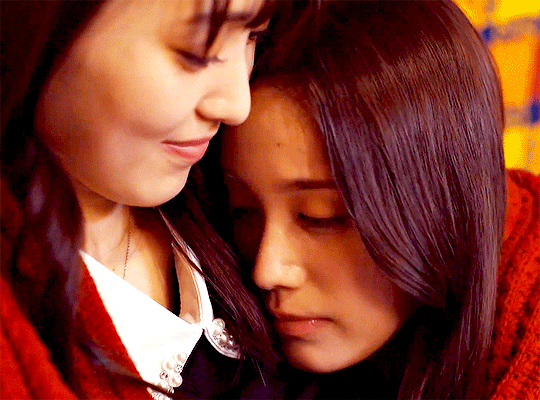
We've reached the stage with this one where I'm just gonna say we should keep watching for the ratings and enjoy the pretty gifs.
Tsukuritai Onna to Tabetai Onna 2
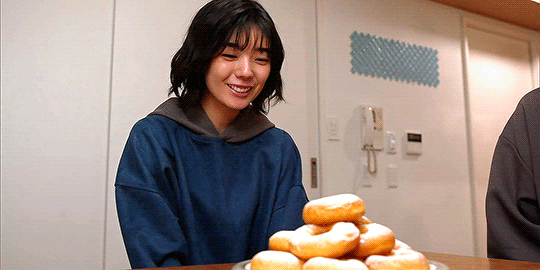
I got to watch episodes 5-8 of the new season this week, and I promptly lost my mind over how good this show is. It somehow got even better between seasons; the creators have some things to say about the experiences of women under heterosexual patriarchy. I already wrote about Kasuga's family trauma storyline and how much it meant to me, but these episodes also gave us Nomoto's ongoing queer awakening and journey to define her sexuality, the introduction of a new queer bestie in Yako, a better understanding of Nagumo and the careful and steady deepening of her relationship with the gals, a new confidant for Kasgua in Fujita, and Nomoto and Kasuga inching ever closer to defining what they are to each other. The world of the show and the support network around our leads continues to expand, and I am loving every moment. This drama is excellent and I cannot implore you enough to go to @furritsubs and catch up.
My Strawberry Film

Kicking off the last Drama Shower show of the season! This is a high school story featuring a classic trio—the Pining Gay, the Chaos Bisexual, and the Budding Lesbian. Obviously, I love them. I like the mood of this one—it's quite a tonal shift from the last show in this series—and the color grading is blue, blue, blue. And there's a mystery afoot as they try to track down the beautiful girl captured on film. Looking forward to more!
Sukiyanen Kedo Do Yaro ka
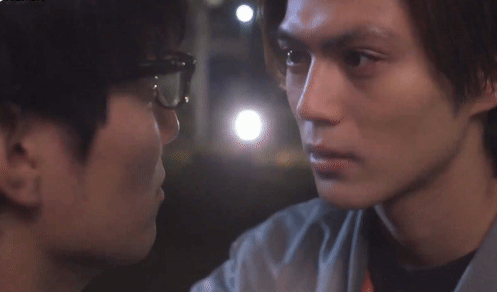
I continue to love this show, though I am not entirely sure how I feel about the turn things took with Mizuki this week. I did not really want this to go the full blown love triangle route; I am more interested in a version of this story where Sakae and Soga try to figure out these adult complications from the foundation of being in a relationship, not with the constant interference of a third party. So few dramas are willing to get the couple together early and let them face things together rather than constantly playing the will they, won't they game, and I was hoping Sukidoya was going to be one of them. That said, I like that Mizuki is sticking around in the story because he's an interesting character, and I like the conflict with Soga's job (we have a preponderance of Japanese shows about unreasonable work conditions airing atm) and the temporary nature of his time in Osaka. That he's worried about eventually leaving tells you all you need to know about how much he likes and respects Sakae. If he felt casual about him he would not be worried about complications that far down the timeline. Let's see where they take this love triangle thing next week; I'm hoping it will be brief.
Perfect Propose
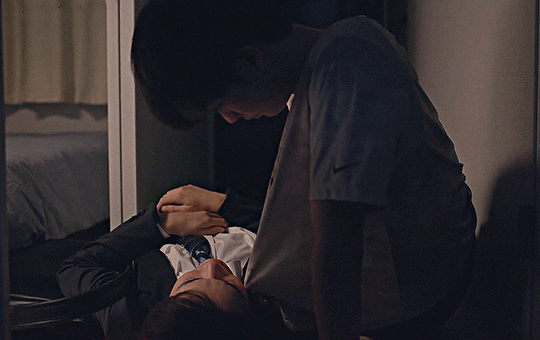
Great episode this week, and I love the way they continue to deepen the backstory for these two. Hiro being the first person to need Kai rather than pity him makes so much sense for their dynamic and why Kai would be so attached to him. And of course, when Kai returns the situation is the same; Hiro definitely still needs him. I love that they took a source of shame for Hiro and turned it into a reason why he and Kai are so compatible. Kai wants to take care of him—and he's not the only one! Loved seeing Hiro's coworkers express concern for his well-being and recognize how this job is grinding him down and breaking his spirit. It was so validating to hear from another high performer that the job is miserable and he should quit. It has nothing to do with failure; as Kaneko said, it's about seeking the life he truly wants. He sees Hiro's talent and knows he will not be able to flourish in this hellish work environment, and I thought it was so kind and compassionate of him to try to help Hiro see that. Also shoutout to Hiyori for sitting her ass back down and missing the last train when she realized prime gossip was about to arrive to her table, she's just like me fr.
Ossan's Love Returns

We are clearly in the drama spiral for the season now, and this show seems to be coming for my beloved Kurosawa. Thanks, I hate it! But the show found its humor again this week even as the sad plotlines for the side characters continued, and I was very happy to see it back in top form. I loved this story with Maki and Haruta caring for Goro for the week, and how it affirmed for them that they are actually not interested in having children. I told @bengiyo and @twig-tea when we saw last week's preview that Maki seemed like the type who wouldn't like children, and I was glad to see that affirmed by the show, and crucially, that he didn't change his mind via the power of Goro's cuteness. Not all people want to be parents, and it's so nice and refreshing to see a loving couple decide they just want to focus on each other, and that you can like kids and spend time with them without needing to have one of your own. I loved, too, that we got some focus on Chizu's struggles as a single mom, and her family rallied around her and made it clear she has support. Takegawa's sudden not-at-all-selfishly-motivated interest in polyamory was hilarious, as was Chief's journey to figure out what was causing his stress—until it wasn't, of course. I was glad Chuoko was with him when he got the news. And I am really hoping that rooftop kiss was Kiku's goodbye, and we will be seeing him move on from Izumi soon.
Bonus: Kimi no Koto Dake Mite Itai
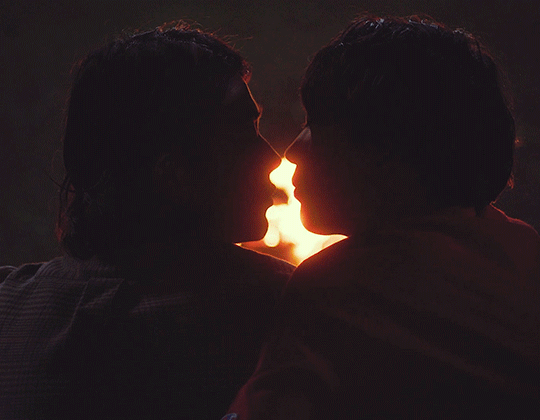
Shoutout to @my-rose-tinted-glasses for giffing this show and reminding me I still hadn't seen it! It was not accessible to me back when it came out and it fell off my radar for awhile. I watched today and thought it was just delightful. A short, sweet, warm hug of a friends to lovers high school bl with two very lovable leads. I highly recommend checking it out.
#japanese ql corner#chaser game w#tsukuritai onna to tabetai onna#she loves to cook and she loves to eat#my strawberry film#sukiyanen kedo do yaro ka#perfect propose#ossan's love returns#kimi no koto dake mite itai#i want to see only you#japanese bl#japanese gl#shan shouts into the void
102 notes
·
View notes
Note
I'm gonna jump in the discourse lol, I don't pass as a trans woman and I don't think I'll care to. But demilypyro was advocating for living as your best self, she happens to be in a country that funded her transition? But other than that she's like poor too. Idk it feels like everyone's just looking for trouble because she was responding to hate with snark
okay people really don’t get this so i’m gonna tell y’all a story. my story.
i’m a trans woman with a fuckload of privilege. i’m pretty, i’m passing, and i have a platform, but most importantly, i had the privilege of starting my transition when i was financially stable on my own in largely supportive environments. and i recognize these things now but i didn’t always.
i started my transition in may of 2020, during the height of lockdown. and at that time, i was working a cushy corporate salaried desk job with full benefits which included both therapy and gender affirming care. i got on hrt quickly, and because of good genes, because masculine asian features are regarded as feminine in western beauty standards, because i’m really fucking good at makeup, and because i was working from home and there was no where to go, i was able to stop boymoding by october of 2020, about 6 months after i started hrt.
and then around that same time, i had another stroke of luck. i made a tiktok about coming out at work, which i did in the most extra way imaginable, and that tiktok went viral. it got 300k views and overnight i went from having 150 followers on tiktok to several thousand. and a less than a year later, that grew to 100k.
that year was rough as hell. i transitioned during a time where going out into the world to find community was impossible. and i lost my job. and i got divorced. and i cut out my family. and because of all of that, i felt like i was doing better than a lot of other trans people. cause i was facing hardships and still doing incredible.
but even so, i was longing for community that would validate and accept me the way that i was validated and accepted online. and so over the next year, i moved across the country three times, something i was able to do only because i was able to afford it
during that year i finally started to get out and meet queer people as the pandemic slowed down. and as i connected with queer and trans people in varying stages on their own journey, i realized the enormous privilege of being able to transition, afford therapy, afford my meds, afford moving to a place where i could find community. i wasn’t just “better at being trans”, i was just luckier than most.
being able to accept being trans is so dependent on having the support structure around you to process what you are feeling. being able to socially transition is dependent on having the people around you who will accept your identity and being in a place where you are able to do so safely. being able to medically transition is dependent on having the physical health and financial stability to do so.
privilege is something that needs to be constantly dismantled within our community because privilege is the main weapon that is used to oppress us.
the fact that this demily person made a snide sarcastic comment doesn’t change the fact that she sought out a person without a following to shit on someone without a following. the inherent privilege of saying something like, “i’m better at being trans” even if she didn’t mean it seriously, shows that she doesn’t recognize the privilege of being in a place where you can learn to accept yourself.
and on top of all that because she’s a person with a following and a platform, the danger of that kind of thinking compounds and is worth calling out.
i’m not misunderstanding her intentions or the context.
you are misunderstanding privilege.
131 notes
·
View notes
Text
Till the End of the Moon: Unconventional Enemies to Lovers
A few months ago I posted my own personal thoughts on enemies-to-lovers that don't cross my own personal red lines. Since then, I enjoyed watching the absolutely next-level cdrama TILL THE END OF THE MOON, which is a uniquely complex and delicious take on the enemies to lovers trope which goes way harder than any other ETL I've ever seen. In this post I'd like to break down how TTEOTM addresses each of my points in turn, and I think this will highlight two unique features of this story: the wonderful complexity of the characters' alignment between good and evil, and the way that the ending, while flawed, unconventional and not completely satisfying, nevertheless makes a certain amount of dramatic sense.
In case that wasn't obvious right away, SPOILERS AHEAD.
Remember that evil is not misunderstood.
This point is about keeping your moral categories straight and not treating something genuinely problematic as though it's just a misunderstanding. One of the really fascinating things about TILL THE END OF THE MOON is that you couldn't quite call Tantai Jin either evil OR misunderstood. Instead, he's a complex mixture of both - a man who uses demon magic, wears black, and tends towards vengeance and mayhem when he feels attacked, yes, but who deep down very profoundly just needs to be loved. The show proves this over and over. Tantai Jin only acts out when he feels threatened or betrayed, when his belief that no one will ever love him is validated by the actions of those around him. On the other hand, when people show love towards him, he responds with wary but genuine trust, affection, and self-sacrifice. Our heroine Li Susu and others are quick to misunderstand Tantai Jin, but this is mainly because of the sinister vibes that surround him on account of him being picked out as the Devil God's future vessel. So, is he evil or misunderstood? He's a bit of both, and the really delightful thing about this show is that it does a beautiful job of keeping its categories straight, resolving misunderstandings quickly but doing the hard yards when it comes to addressing Tantai Jin's propensities towards vengeance.
Enemies doesn't need to mean hatred or toxicity.
Every romance needs reasons for the characters to love and trust each other, despite the things that are keeping them apart. TILL THE END OF THE MOON, again, takes a super complex approach to this point as well. Both Li Susu and Tantai Jin have incredibly mixed feelings towards each other. Li Susu deeply hates the Devil God and throughout the show, the major obstacle standing in the way of her learning to love Tantai Jin is her hatred of what she believes he will one day become. This provokes her to whip him, betray him, and plan his death. But she also sees very clearly that Tantai Jin is a pitiable outcast who has only ever known hatred and suffering. When she defends him, he quickly warms up to her. Tantai Jin, meanwhile, has heard Li Susu's vows of undying hatred and hostility, but has no defences against her practical acts of kindness and self-sacrifice. When she starts telling him that she loves him, he believes it because he so desperately wants to. Then, when she betrays him, his hostility is born of desperation: he thinks her cruel and heartless for toying with him. And when she comes back to him, he's so desperate for her love that he accepts her without reservation, making himself wholly vulnerable. Is there hatred between these two? Undoubtedly. But it's allied with an equally irresistible love and compassion. Like all the best enemies-to-lovers stories, and more than most, TILL THE END OF THE MOON gives the characters a choice between a hatred that will destroy them and a love that can heal them.
Remember that ETL is a fundamentally transformative relationship.
Normally what I mean by this is that enemies-to-lovers will usually involve a profound character arc for at least one of the characters, often from evil to good. TILL THE END OF THE MOON tackles this particular element with incredible complexity. When Li Susu gets to know Tantai Jin, he's cunning and manipulative, but just trying to survive. The two of them embark on a deeply transformative journey, but it is nothing so clear-cut as a journey from villainy to goodness or vice versa. Tantai Jin flirts with villainy before ultimately drawing away from it. By the time he actually does ascend to become the Devil God in the final quarter, it isn't because he's become evil - rather, he's playing the long game, positioning himself and Li Susu to destroy the Devil God once and for all. The important part of Tantai Jin's character arc is learning to accept love from himself and from people around him, to the point that he no longer responds to perceived rejection with vengeful rage. Similarly, the show also brings Susu to a point where she is able to let go of her deap-seated fear of the Devil God. By the end, she has become able to trust her beloved and make herself vulnerable to him even AFTER he's become the Devil God - a truly incredible arc.
I've heard a lot of people saying that the show TTEOTM differs from the book TTEOTM sharply in that Show!Tantai Jin is much less of a villain than Book!Tantai Jin. Normally, this would impair my enjoyment - I'm usually the one shouting at the screen to LET your baddie be a baddie, for heaven's sake. Not having read the book, I can't actually compare the two, but I CAN say that I'm so impressed by how the show revels in shades of grey. Instead of simplifying the male lead's morality, the story allows it to be messy and complex. Neither Li Susu nor Tantai Jin can fit easily into good and evil categories. I appreciate this immensely.
The characters should be a match for each other, especially when it comes to power and to morals.
Similarly, I'm fascinated by how TILL THE END OF THE MOON treats Li Susu, our token "good" half of the couple. She's the Lady of Light, but in the midst of her crusade she's stubborn. She's cruel. She's vengeful. She spends SO MUCH of the story refusing to believe that Tantai Jin can defy fate, and when she meets him again after undergoing 500 years of suffering to find her, she still refuses to acknowledge that she is the woman who loved him, because she fears it will give the Devil God a new foothold in the world. Throughout the story she lies to him, betrays him, and wields or withholds her affection like a weapon. (This, combined with the long stretches of the show in which she is far more powerful than Tantai Jin, reverses a lot of common gender tropes in some really fun ways). In fact Li Susu is kind of terrible, and I love that for her and for the show because now it's not about a pure and good person suffering for the love of a villain - it's about two dark and deeply flawed people hurting each other equally. Similarly, Tantai Jin just isn't a villain, despite the aesthetics.
There doesn't need to be a HEA.
I don't think that every romance needs a happy ending - look at WUTHERING HEIGHTS. While it's imperfect, I don't think that TTEOTM has an unhappy ending per se. I trust that our boy is going to cultivate himself right out of that Heart-Guarding Scale. Tantai Jin and Li Susu definitely deserve their happy ending if any couple does - they've worked through their differences and are now totally vulnerable with and accepting of each other. However, it's fascinating that they don't quite get a HEA - or need to wait a long time for it - for reasons that actually sit pretty well with me. Namely, it was Tantai Jin's fatal flaw all along that he pinned all his sense of self-worth to Li Susu and couldn't face the thought of a life without her. This is that oddest of all things: a love story which cannot end happily until the hero is able to find love and security in people who are NOT the heroine. His feelings for Li Susu are not enough to cure him, because on the deepest level Tantai Jin still doesn't consider himself worthy of love and is willing to settle for whatever crumbs he can pick up off the floor. It takes the love of his shifu and sect brothers showing him that he is worthy APART from Li Susu, before he can learn to be healthily in love WITH her. By the end, it is this acceptance of himself and all the love shown by people who are NOT Li Susu, which enables Tantai Jin to consume the Devil God rather than to be consumed BY him. It is this which gives him the strength to accept death at Li Susu's hands without seeking to avenge or defend himself, and Li Susu the ability to trust him enough to follow through with it. Again, this is an incredibly complex take on a standard romantic scenario.
Love should be what the villain needs - but not what he wants.
What I mean by this is that if the villain is driven to villainy primarily in order to possess the heroine romantically or sexually, he ought not to get her. But TTEOTM is much more complex than, say, LOVE BETWEEN FAIRY AND DEVIL*, in which Orchid represents the moral growth the Evil Overlord needs rather than the world domination he wants. For one thing, Tantai Jin is not a villain when he first meets Li Susu, he never quite becomes one, and many of his most villainous actions are are direct response to her perceived enmity. They are self-preservation or revenge. Also, for much of the story, there is nothing Tantai Jin wants as much as Li Susu, and all his actions, good and bad, are either attempts to win her favour or retaliation for perceived or actual betrayal.
In retrospect, perhaps this was always an indication of how the story was going to end. Tantai Jin WANTS Li Susu to love him from very early on. But his need is quite different. He NEEDS to accept love and esteem from himself and from others, because so long as he pins all his sense of self-worth to the murder wifey he will never be stable or sane. One of the really beautiful things about the final quarter of the story, despite its messiness, is seeing Tantai Jin flower into someone who is finally able to accept his own worthiness. After so many episodes in which he's been suffering, paranoid and hurting, he's finally able to achieve an even keel - not through the Heartless Way, but through experiencing love. This time, when he feels threatened by the rejection of one person, he has the love of others to fall back on. Thus, the ending of this show was never going to be about whether Tantai Jin could love Li Susu: he has from the beginning. It was going to be about whether he could learn to see himself as worthy of love.
For Tantai Jin, additionally, getting what he needs doesn't mean that he can't also get what he wants. Tantai Jin has never been SO villainous - so cruel, selfish, and obdurate - that getting what he wants would be a grave injustice. And, getting what he needs - the love of others - is not incompatible with what he wants - the love of Li Susu. Indeed it's the only condition upon which he CAN have a healthy relationship with Li Susu. I think this is why the ending, as messy and flawed as it is, is not a dealbreaker and even makes a weird amount of sense. The fact that Tantai Jin clearly gets what he Needs prevents it all from feeling as utterly wasteful and stupid as, say, TROS did. And then the door is left just a crack ajar for him one to day to get what he Wants, too.
In conclusion, then, TTEOTM is an incredibly ambitious, complex story which goes harder than just about any other enemies-to-lovers story I can think of and sets itself up for an unconventional ending in making the core of its story about whether the hero can learn to love himself. While it's not perfect, I feel like it's an enemies-to-lovers masterclass which I'll be revisiting early and often.
* As a footnote, when I say that TTEOTM is less complex than LBFAD, this isn't meant as a ding. LBFAD is simpler and less ambitious, but also more successful. It's often the way.
#cdrama#till the end of the moon#tteotm#enemies to lovers#etl#writing#love between fairy and devil#lbfad
144 notes
·
View notes
Text
My Beautiful Man 2 Ep 4 (Finale) Stray Thoughts
It really is incredible how many shows are ending this week.
Last time, things finally came to a head with Hira and Kiyoi. Hira thought that Kiyoi would dump him because he didn't win a photo competition, but Kiyoi was completely supporting and realistic about breaking into art professionally. Hira had family visit, and the fallout of that visit revealed that Hira had been worshipping Kiyoi for years. Kiyoi felt betrayed that he was in this relationship alone, and that Hira wasn't seeing him as a man, and broke things off.
Many people were sad, but I was relieved. Hira needs to see the reality of the world he inhabits with Kiyoi.
I really like Kiyoi coming back to the house, but sleeping away from Hira. Hira needed to understand that he could lose Kiyoi, but Kiyoi is also showing him that he's not a fickle person.
Demanding that Hira explain why he didn't come after him if he was worried is valid.
"I won't kiss you for a while...until you face me properly," is also completely reasonable. I don't think Hira appreciates the nuance that Kiyoi does still want to kiss him very badly, but I like it.
I do like a reunion party as a way to assess how characters have grown or not.
I love Kiyoi. I love that he's been trying to figure out what Hira's block has been for years, and is pushing past his own comfort zone to speak directly to Hira about their problems.
Anna is amazing. Nothing horrible better happen to her.
This photographer, Noguchi Hiromi has immaculate vibes.
Yes, Noguchi-san!! Read him for filth! Read him for blood! Hira needs this.
Man, Hira and Kiyoi reach incredible levels of tenderness that I really only ever feel from Japanese productions.
That was a really fantastic kiss.
Genuinely excited about this movie and what Hira striving to stand beside Kiyoi looks like.
Final Verdict: 10, Highly Recommended. It's so rare that a sequel does a good job with its characters. Oftentimes they contrive reasons for them to be apart. This show continued to use key characters well, and explored the natural roadblocks that would prevent these two from being properly aligned. It's in so many ways continuing the specific struggles these two have with growing up, and even introduced two mentors for the future. This gives me hope about the potential to tell ongoing stories with our couples, and not just have them always say goodbye when they get together.
#utsukushii kare 2#utsukushii kare#my beautiful man 2#my beautiful man#japanese bl#bl series#Ben watches
110 notes
·
View notes
Text
Okay, I need to rant…
Yuukoku no Moriarty
The discrepancies between the manga and the anime have some inherent controversy
I am not that far into the manga yet but in my re-watch of the anime (the Eng Dub is on crunchy roll) I‘m at the backstory episodes and
I want to say my piece, I actually think there are two main things these episodes do better than the manga.
First I want to say I feel the manga does a better job overall with the backstory, that it’s Albert’s agency and his drive and decision
But the scene where the original William is getting killed… I actually prefer the anime version in such that it establishes the dynamic between Albert and Will
"[Albert will] tell us what he wants himself. Though if this were a horse race, I'd be ready to place my bet now."
In the manga, it’s Will attacking/ killing the original William, in the anime it’s Albert
The dynamic I’m referring to is as such: in the anime our Will is the instigator, the mastermind. He offers Albert to rid himself of his brother. He provides the plan and the means of execution. But Will doesn’t interfere.
In my opinion that’s a double proof of trust, because Albert trusts in Will’s planning while Will gets proof that Albert is willing to walk the walk.
It’s more impactful, symbolically, because it shows their further dynamic.
I realise and am aware that Albert is just as cunning and just as much the mastermind behind James Moriarty – that’s how he is portrayed in the manga and I think that’s the correct way. It feels more natural than his just being the outside face we get in the anime.
However he has to proof to himself – and to Will – that he is capable of what it takes. That’s why Albert stabbing his brother is more significant than Will doing it. We know Will isn’t above getting his hands dirty. But establishing Albert’s own agency, showing his own drive as strong enough? Yes!
Especially with our Will thanking him after the fact. Because Will provided him with a chance and that better returns what Albert did for him, I think. Because as Will said, it is about exchanging debts and favours. So Will providing chances and the agency still being inherently Albert’s own is meaningful.
So I think that was/ is better in the anime compared to the manga.
The second thing I preferred from the anime over the manga is the house fire. Not the outcome or anything but the method itself.
Obviously both work, sure. But a gas explosion? Making sure the air is too hot to breath even if the inhabitants don’t immediately die from the explosion. It’s more efficient and elegant, in my opinion.
I understand both methods are valid and work well but the gas explosion, flooding the entire mansion with gas before setting up a timed trigger? That’s efficient, brutal, elegant.
I acknowledge accumulating the wax in the lamps took more long-hand planning but I still prefer the anime version.
Overall the manga is obviously better, I fully agree. Albert gets more agency, we get a different perspective on their entire dynamic. Albert founding the MI6 for the sole purpose of sharing those reigns with Will. It’s beautiful and it’s the superior version of the story.
I just have opinions on Will vs. Albert killing the original William and the way the house fire was set-up/ triggered
#YNM#yuukoku no moriarty#moriarty the patriot#mtp#mtp anime#ynm Anime#ynm manga#mtp manga#yuumori#fandom rambles#fanfic ramblings
21 notes
·
View notes
Note
Hi. First of all, I wanted to apologize for my rant. I was not angry at your or anyone, but the just the constant whitewashing that's been happening recently in the fandom, like a recent whitewashed art of Yrene. Anyway, my anger was directed towards artists in the SJM fandom who for some reason choose to make male characters brown but when it comes to female characters they whitewash them. I'm brown btw and I read so many diverse books from diverse authors with POC as the lead like The City of Brass for example and that series still gets whitewashed btw and it's all just so frustrating. The author will explicitly describe a character with brown skin and she will still be drawn paler. The golden tan characters in SJM's books like Bryce for instance is constantly drawn paler and it's just like why?? I don't understand it. Also, my anger and rant was not directed toward you I just needed to vent I guess. I honestly really apologize for that lengthy rant, i didn't mean for it to be hurtful or anything.
Like The City of Brass is one of my favorite series, the way the main character is described is exactly how I look like. Brown skin, curly black hair, but the countless whitewashed art I've seen of her is really triggering. They make her paler, give her straight silky hair instead of curly. It frustrates me to no end. I've had this pent up for a while and I wanted to rant (not at you though) at the whole whitewashing thing. I promise I won't flood your inbox again, I know it was uncalled for. I think your blog is great and really enlightening so I apologize.
Thank you for clarifying. I don't mind long asks or anything, I just assumed you were angry at me, so I'm sorry if I came off as rude or curt. You are welcome to flood my inbox 💜 And I appreciate that you took the time to further explain how you feel, and that the root issue isn't Bryce/SJM, but is the fandom's depiction of darker skinned characters, exemplified in how Bryce is depicted.
It's good that you read many diverse books by diverse authors, but you're right--if fandom doesn't step up to properly support these authors and do justice to the characters, then the impact those diverse series have is minimal.
Whitewashing is a huge problem, and for that artists are 100% responsible for choosing to ignore canon and for choosing to depict characters of color as Eurocentric as possible. Skin bleaching to lighten our skin and relaxers to straighten our hair and colored contacts to give us light eyes and nose jobs to give us European noses--these all exist, and are popular, because society and the media constantly tell us that only whiteness is beautiful. That only whiteness is valuable. That only whiteness is human. So people who stray farther from whiteness are dehumanized, and are treated worse by society.
And that's why representation and why diverse works are so important, because they challenge that idea. Representation allows for people of color to be seen as beautiful, and valuable, and human, when we historically haven't been seen as such. It shows that we deserve to lead our own stories, and that we deserve escapism too, because we're human and we deserve breaks from the real world like everyone else. So when diverse characters are whitewashed, it's like a slap in the face. These characters are meant to challenge Eurocentricity, and whitewashing them simply adheres to it. Your feelings are perfectly valid, and it hurts whenever a character is whitewashed because it's simply perpetuating the message that's been shoved down our throat since we were children--that only whiteness is beautiful, that only whiteness is valuable, that only whiteness is human, and therefore, characters can't look too non-white, much less be non-white.
I do have a lot more thoughts on whitewashing and how it differs from racebending in response to some discourse™ in the Little Mermaid tag, and I do want to make a longer post about it, but I will leave you with this:
a) Your feelings are very valid. Whitewashing diverse characters perpetuates Eurocentricity, and fandom has a racism problem.
b) Representation matters. Now and forever.
#ask#anon#racism#whitewashing#on media#fandom racism#colorism#representation matters#we all deserve so much better#fandom problems#fandom wank#diversity in media#representation
20 notes
·
View notes
Note
Hey:) have you read the ATLA comic Love is a Battlefield? I'd love to hear your thoughts on it !
The comic makes me seriously wonder what the person who okayed it was drinking.
For one, it’s the single best demonstration anyone might need that the conflict the ship is based on isn’t one you want to have in your romance under any circumstances—that between a girl who’s just not that into a guy and said guy who won’t take no for an answer.
It single-handedly validates every anti-cataanger out there—Aang’s portrayed as entitled, selfish, and utterly delusional about his relationship with Katara who is supposed to have no voice in it and quietly conform to his idea of her and their bond instead of functioning as a separate being with her own wants and notions.
But let’s bring the receipts, shall we?
So the story begins innocuously enough, with Aang drawing the air and water symbols in the sand and adding a heart around them. Cute and innocent so far, I like. Katara appears, acting as though she wants to talk to him, and Aang concludes it’s about the invasion kiss. Why would he think that is beyond me but let’s roll with it. But instead of delving into that particular can of worms, Katara splashes Aang with some water in an attempt to get him to practice.
He doesn’t take it well.
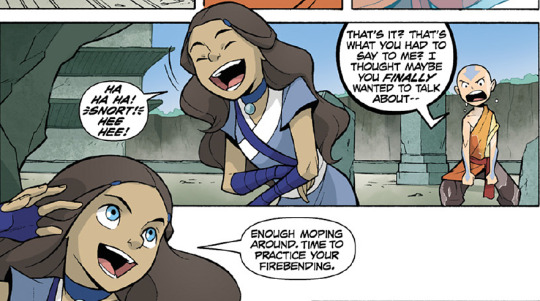
Notice the bold “finally”. What this says to me is that in Aang’s mind, it’s Katara’s job to come to him and report as his girlfriend, just by virtue of being kissed, and it’s been mighty upsetting to him that she “failed” to do so.
After all, consider The Ember Island Players:
“We kissed at the Invasion, and I thought we were gonna be together.”
Aang doing a thing means that Aang & Katara did a thing mutually.
In his view, he isn’t supposed to be the one who approaches her and explains why he saw fit to plant one on her; who opens up about his feelings and initiates a frank conversation. No, that was a claiming kiss at the invasion and Katara can only acknowledge it as such and reciprocate.
Our Every RomCom Guy Ever doesn’t realize that Katara not talking to him about it is the answer to where they stand.
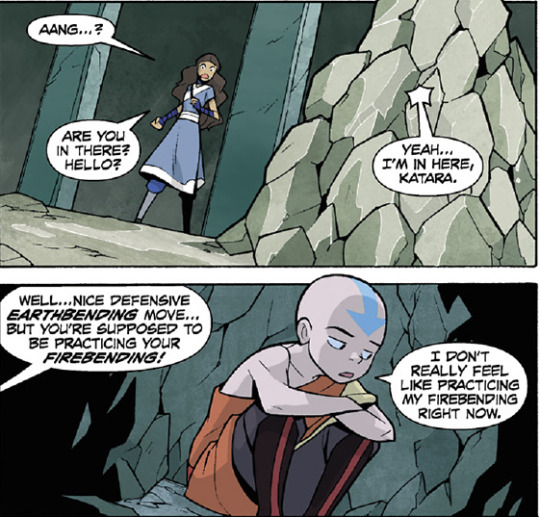
This is the third time in as many pages, btw, that Katara tries to get Aang to practice. And for a good reason because we’re a short while removed from The Western Air Temple where he yet again refused to face up to an unpleasant truth and instead had to be literally chased around like an unruly child. Katara’s fully in a sifu mode here, not even perceiving the opportunity to talk about their relationship. And if an assertive fourteen-year old doesn’t think to talk about her second ever kiss with the guy who gave it to her, that should tell you all you need to know about how much she appreciated it.
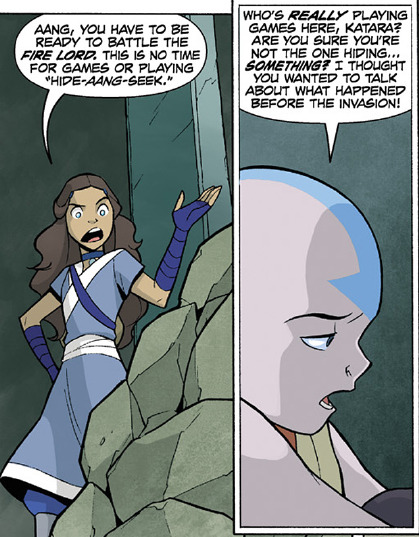
Aand that’s fourth time. Katara really seems to think that taking down this Fire Lord dude is important or something and that Aang is once again failing to prepare for it. Look, she even has a nickname for it at this point. Yet for some reason, Nice Guy Aang reframes the situation—WHILE HIDING IN A LITERAL ROCK—as a role reversal where it’s Katara running away from confrontation and having to face the truth, even though he revealed in this very scene that he didn’t think it was his job to be open about his feelings with the girl he believes he loves.
At last, Katara realizes Aang’s hinting at the invasion kiss and reacts like any girl who’s harbouring a secret crush would—by visibly cringing and pretending she doesn’t know what he’s talking about and the wind’s really strong for her to hear what he’s saying anyway so maybe it’d be a good idea for Aang to come out and practice? (fifth time)
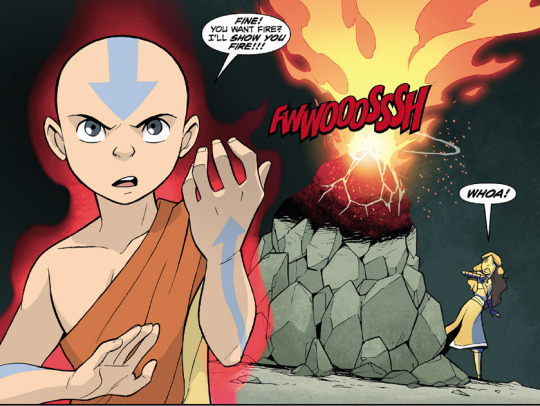
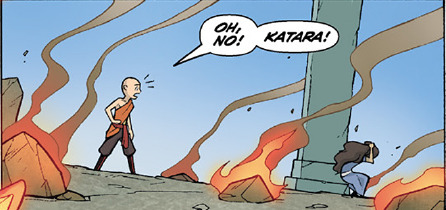
Finally, supreme gentleman Aang does the one thing he’s not supposed to do—he loses control and depending on how charitable you are either puts Katara in harm’s way (by firebending, weird how that keeps happening), or outright assaults her in blind rage.
Luckily, Katara’s just glad that Zuko’s training is yielding results and maybe the world won’t end in an Ozai-induced inferno by the end of the summer.
Scorned LoverBoi couldn’t give less of a shit, though.
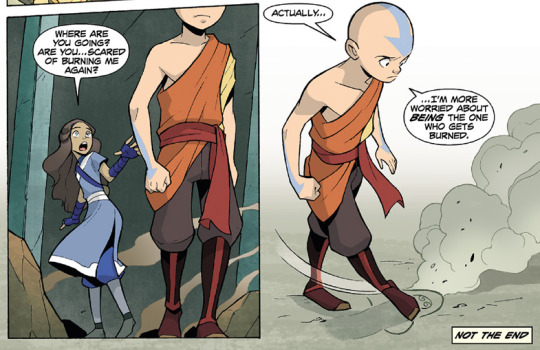
And there you have it, explicitly in the text. Katara, despite showing no signs of attraction and not encouraging Aang’s advances in any way, is perceived by him as someone who’s cruelly toying with his feelings—simply because her reactions don’t conform to what he wants them to be. The relationship is utterly about him and it’s so mean of Katara that she doesn’t feel like playing the demure cut-out in his hero-gets-the-girl routine.
Let’s not mince words, this is some prime incel logic Aang’s operating on.
And the creators don’t seem to realize this. Which is why they never challenge him on his behaviour in the show, reward it in the finale, and go on reaffirming it in every single post-canon material there is.
And I find it sort of infuriatingly hilarious that someone not only conceived of the ship this way, but thought it was a good idea to present it to the world as a basic vanilla romance.
Which makes me wonder.
Because as strange as this might sound, there is a universe where this story is not only perfectly okay, but absolutely crucial to the overall narrative.
That is if the show actually followed up on The Guru and culminated in Aang letting go of Katara to unlock the Avatar state.
From start to finish, the comic proves Pathik completely and utterly right—what Aang feels for Katara isn’t selfless love, it’s selfish attachment. But instead of it being cloaked in vague religious language, we see it manifest in a painfully tangible way. The story’s kinda unintentionally brilliant if you read it like this—it’s show to Pathik’s tell. Aang is too wrapped up in what he feels to see the signs and runs away from having to acknowledge the painful reality that’s clearly evident, i.e. that Katara doesn’t love him. And because he’s so invested in his delusions, he blows up whenever challenged on them, acting on entitlement and baseless expectations and going so far as to slowly kill the beautiful relationship they actually do have—a lifelong bromance.
If this story foreshadowed that Aang needed to let go of his attachment not only to save the world, but to even keep Katara in his life, I’d be fully on board.
But for that to happen, the creators would have to take a step back, start considering perspectives beyond Aang’s, and stop treating him like an infallible bringer of truths who deserves human prizes just for doing his job.
And if they were able to do that then we wouldn’t be here in the first place.
922 notes
·
View notes
Note
So now that you caught up with Amphibia and cause it'd be fun seeing you answer an Amphibia question, do you think it does a better job conveying important information on screen than Ducktales inspite of usually having their episodes at 11 minutes instead of 22 like Ducktales and why?
Oh absolutely.
I cannot stress enough how much I love the way the conflict between Anne and Hop-pop in regards to the music box was handled. My favorite part of that plot was even though Anne said she forgave him at the of After The Rain, deep down she was still hurt and struggled to truly forgive him for lying about and hiding the music box.
The conflict isn’t one-sided either. Both of them have their reasons for what they did, at the end of the day Hop-pop was the one who messed up, but he did what he thought was right to protect his family. He owns up to hurting Anne and that he made a mistake by never telling her what he found out about the box and it’s potential dangers.
Having there still be tension between them during the majority of First Temple was a great way to show how sometimes forgiveness takes awhile to be accepted. Sometimes a simple apology isn’t enough.
The best part of this conflict is at the breaking point when Hop-pop is begging Anne to tell him how he can fix this and help her forgive him and Anne straights up tells him, “I don’t know.”
That type of response is completely believable and real.
And then this wonderful conversation that happens afterwards,
“I just need time... Look, I want things to go back to the way they were but... but...”
“I’m sorry, Anne. You take all the time you need. Maybe it’s enough to admit we’ve still got issues instead of pretending they don’t exist.”
“I think that’d be good.”
Anne knows Hop-pop is sorry, but knowing that somebody is sorry sometimes isn’t enough to fix things. When someone hurts you as badly as Hop-pop has hurt Anne, that’s a wound that needs time to heal.
And the fact Hop-pop is willing to let her take her time and no longer force her to forgive him shows how much he’s grown to love Anne as his own kid and how much he understands Anne as a person. He loves and respect her and he’s gonna give her the space she needs to let herself forgive him.
This show is so good at having people talk and acknowledge their issues and actually work on those issues. Which is more than what DT tried to do.
One of the things I’ve been enjoying about Amphibia is how they aren’t afraid to acknowledge the conflicts they’ve created, they deal with those conflicts and the characters learn from those conflicts and it shows.
This is done really well when it comes to Sasha’s story, who is a really well written character, and how the other characters react to her presence. The constant suspicion the Plantars and Anne have about Sasha the entire time she’s around because of what she did to them back in the season one finale? Completely valid and justified.
Anne continuing to stand up to Sasha and letting her know Sasha can’t push her around anymore? Amazing.
Sasha trying to put on an act that she’s changed and is only following Grimes’ plan but we still have those moments she could possibly be having second thoughts about her loyalty? Again, really well done.
I really adore the way Anne, Sasha and Marcy have all been written, between their personalities, stories, growth, and arcs, they’re all unique and so far been done really well.
Amphibia is such a fun time and it’s so good to watch a show and feel like every episode is worth it. They take time for their silly episodic episodes but they never forget the story they’re telling nor the tensions and conflicts that follow it, and it’s an amazing watch.
One final thing is that I am so happy that the Plantars don’t talk about how they’re family every five freaking seconds. I swear to god DuckTales said the word family every other sentence and preached it like it was some type of religion and it was like omg pls stfu about how you’re family and how amazing your family is and actually SHOW us how you’re a family. The way DuckTales treated its family concept is a whole thing and while I don’t dislike the entirety of how they handled it, we definitely did not need the show to shove its family message down our throats I can tell you that.
The Plantars just are a family. We see how much Hop-pop, Sprig, Polly and Anne love each other, how close they’ve become, how much they would sacrifice for each other, how much they’ve grown, and how much they care for one another. We are SHOWN all that and seeing a family be a family is so beautiful and the found family message of the show is so well done because Anne is just a part of the Plantars. They love her and she loves them.
There’s no preaching, no shoving anything in anyone’s faces, no saying “we’re family” every 2 seconds, none of that, it’s just... A family.
The Plantars are family and we will show you how they are a family.
#hello amphibia essay#can y’all tell I rlly like this show?#cuz I do WHEEZE#amphibia#amphibia deserves better#anne boonchuy#sprig plantar#polly plantar#hop pop plantar#sasha waybright#marcy wu
84 notes
·
View notes
Text
y’know i love sk8 the infinity as an anime and i love the characters in it so goddamn much, but i also think that it serves as a really good representation of a whole generation, and especially the queer subgroups of that generation (as well as the intergenerational alliances queer youth + adults share).
like, you can definitely tell that reki and langa are both neurodivergent. reki screams burnt-out gifted kid that never realized they had adhd, while langa fits into the archetypal quiet kid who probably has undiagnosed autism. they reflect two groups of people in gen z who have found themselves and their communities on the internet, and have by extension bonded with each other over those shared experiences. not only that, but both boys represent the complex feelings of discovering that hey, you might just be in love with your best friend. (they also do, in my opinion, a really good job at showing the highs and lows of that in a way that never quite veers into the overly-dramatic.)
i remember in the q&a twitch stream a couple weeks ago that joe’s voice actor jonah scott said that reki and joe’s relationship had the quality of an older person in the queer community taking a younger person coming into their identity under their wing to let them know that their feelings were completely valid and nothing to be ashamed of. not only did i totally get the same feeling myself, but it really made me think about how amazing it was that they included that part of discovering your identity in your later teen years.
speaking from experience gen z is one that has been raised to, as much as they can be, be proud of who they are and how they identify, because most of the older ones were raised by parents who had to deal with boomer bigotry. and not only did most of our parents teach us that, but the internet opened up a world of connections to people like us, people who were there to tell us that everything we were feeling was okay, like joe was for reki.
(also a little aside about miya—he definitely reminds me of a lot of the younger gen z kids i’ve seen popping up on the internet lately. they tend to be hyper-involved in internet culture and have a wildly different way of interacting with their peers than older gen z-ers, despite the fact that they’re all in the same generation. they have a sense of entitlement that we don’t, since most of them have always grown up in a society with internet and advanced technology, unlike the older half of the generation.)
i think what makes sk8 such a hit, and what will probably make it a queer cultural touchstone anime like yuri on ice, is that no matter where you are in life or how you identify, you can find some part of yourself in the amazing ensemble cast. maybe you see your younger self in reki or langa, or the way you are now in joe or cherry (or even shadow), but you can find some piece of it that resonates with you. that connects you to and invests you in the story. and i think that it’s stories like this that create something beautiful and long-lasting.
128 notes
·
View notes
Text
How the Jedi Order saved my life
Thanks partially to the ambiguity of the internet it inherently breeds negativity - whether it be for post clicks or actual interpretations of content it doesn’t matter, it’s there and it can be very overwhelming and toxic at the best of times.
One of the victims of so much venomous negativity has been the Jedi Order (specifically the Prequel era Order), a fictional band of warrior space monks who are the heroes of the Star Wars saga who’s teachings were mostly inspired by Buddhist philosophy. They were the undisputed “good guys” of that universe for multiple decades and then something shifted in fandom and suddenly people are online advocating that their actual in story genocide was warranted because they “failed”.
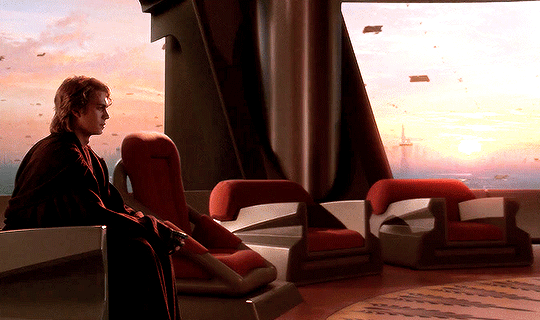
I am not here to debate the merits of the Jedi, please don’t make this blog post a platform for THAT argument, what I want to get across in this post is that for me (and this is just my experience) the Jedi are a source of light and in all complete honesty they saved my life.
This is going to be rather personal…
Due to many, many factors including hormonal/health imbalances and personal trauma (including being the one that had to make the decision/call to take my father off life support) I fell into a severe depression for almost 5 years. I pulled away from everything and everyone I loved, I lost multiple jobs, I physically couldn’t get out of bed most of the time. And then came the day I decided to end it all...end the suffering.
I had made a plan, I had made arrangements and set things up for my loved ones after I was gone. I had one day of life left, so I decided to watch the Star Wars saga one last time because it had at one point been such a big part of my life and I wanted one to enjoy it all one final time.
And on this viewing something struck me. The Jedi had literally lost everything, their friends and the galaxy as a whole turned their backs on them which led to the slaughter of their entire organization. The scene where Yoda and Obi-Wan were walking through the Temple just hit me so hard, both of them watching everything they knew crumble all while feeling the weight of grief and loss on a level none of us can even comprehend.
But while their pain was obvious, especially thanks to the tremendous acting talent of Ewan McGregor neither Obi-Wan or Yoda gave up - they had every reason for them to tell the galaxy to go f*ck themselves, but they didn’t. That wasn’t even an option in either of their minds.

It was their teachings that saved them in the end, the concept of learning to let go of their fears and insecurities, of acknowledging their feelings in order to release them and not dwell on them. To realize that failure is the ultimate teacher and learn from their mistakes (real or perceived). That death is a natural part of life and that true love is about being able to let someone go when the time comes. They also showed that it’s important to do the most good that you can with the hand you are dealt with, that life isn’t easy and the temptation to “fall” to the darkside can be very seductive, but ultimately makes you miserable.
The Jedi - the Prequel Jedi (and their code) saved my life that day.
I remember pausing Revenge of the Sith at the moment Obi-Wan held Luke (or Leia) as Padme died, the lost look on his face, and knowing the resolve that character finds within himself forced me to pick up the phone and call the suicide hotline.

What followed has been a year dedicated to nothing but my mental wellbeing. This included finding a creative outlet that had nothing to do with my career (I am a professional FX makeup artist by trade) and so, I returned to my love of writing Star Wars fanfiction. Having a way to explore the teachings of the Jedi and the strength of these characters have helped me in ways I can’t even explain, it was so noticeable that my therapist asked me what I was doing to be able to make such progress.
I’ll say this again for those in the cheap seats - the Jedi saved my life that day...and their teachings have allowed me to love in ways I never thought possible.
Now, I’m not saying I’m converting to the Jedi religion (though I have a friend who has and that is a valid path for those who have chosen it), but the teachings of the Jedi are inherently good - they teach us to get out of our own heads, listen to our feelings and focus on the beauty around us, that we’re all connected and ALL life (including ours) has value.
So, say what you will about the “failures” of the Jedi, but for me I would not be here if it weren’t for them, their code and their strength. And I have George Lucas specifically to thank for that.
From the bottom of my heart I thank you Obi-Wan, Yoda and George.

#personal#personal post#jedi appreciation#jedi positivity#thank you jedi#attachment is not love#self love#the force#jedi teachings#jedi code#i love the jedi#i am here because of the jedi#worth living for#mental heath support#mental heath awareness#suicide prevention
106 notes
·
View notes
Text
The Inherent Romanticism of Headpats - Why Ship Dazatsu
I was scrolling through the dark corners of bsd tumblr and came across a few “Why I Ship (blank)” posts and thought I’d like to try and articulate my unending love for dazatsu in a similar fashion! Please note that I am in no way trying to steal the spotlight from other ships or trying to claim that dazatsu is “better” - it’s just my favorite and I wanna talk about them! Also, I physically cannot talk about them without a shipper’s bias - I’ve had them in my heart since like late 2016. This is ingrained into my spirit.
So, without further ado, let’s talk about why I ship dazatsu (and why you should too). yes i’m kidding about that last part.
warning for manga spoilers and headers that would make amazing fic titles. tag me if you use one. manga pictures taken from dazaiscans and easygoingscans.
1. The Promise to be Good
hehehe let’s start with maybe the most obvious one that is, arguably, the most canon fact about these two. Just because I choose to view it as romantic doesn’t mean it IS - but it is certainly a beautiful aspect of their relationship and yes it makes me soft every time I think about it.
We all know Dazai’s past and what inspired him to make the switch from the Port Mafia to the side that saves people - Odasaku. No matter what you say, it’s obvious that Oda and Dazai have a very close, meaningful relationship - and arguably, Odasaku had the biggest impact (and the most importance?) in Dazai’s life. When Oda told Dazai to leave the Port Mafia, to go make something beautiful with his life - he did. And it’s those words alone that keep him motivated to stay in his job and help protect the city - because he loves it, maybe, but because someone he loves urged him to.
Dazai, despite what his strange poetry may make you believe, is only human. As much as those words mean to him, he gets discouraged.
Along comes Atsushi, the starving tiger boy by the river. Atsushi is an orphan parallels to oda saving the orphans already, and he was in dire need of someone to save him. So, Dazai did. Whether it was because of the tiger or Odasaku’s last words, Dazai saved Atsushi and gave him life. He provided food, shelter, a means to provide for himself - even companionship. Everything Atsushi has, it started with Dazai picking him up off the riverbed and lugging him along. What’s more, Dazai didn’t just turn him over to somebody else - he presented a case to Fukuzawa to keep him and serves as his mentor. Further along in the canon story, he provides Atsushi with the emotional guidance that he needs (Portrait of a Father, anyone? Let’s cry over that for a second.) He doesn’t just give Atsushi a moment’s care - he helps him build himself up, he supports him, and together, they protect the people of Yokohama.
Atsushi is living, breathing proof that Dazai is living up to his promise to be a good man. Even better, he seems to be perfectly happy with confirming that yes, Dazai is good, whenever Dazai needs it.
In this way, they complete each other. They provide a source of comfort that nobody else has been able to. Atsushi is Dazai’s proof that he is doing the one thing he wants to do, more than anything - be what Odasaku wanted.

2. You Saved Me, We Save Each Other
Keeping that in mind, Atsushi is sort of Dazai’s reward for being good. Now, I’m not implying Dazai is owed Atsushi at all - to an extent, you could argue Atsushi is maybe even too good for Dazai. But Dazai is trying to be a good man, and Atsushi is the one who tells him and reaffirms his efforts and gives him that praise, that recognition, that reward for being good. Dazai’s main inspiration to stay on the light(er) side is Odasaku - but that doesn’t mean that Atsushi can’t become another huge driving force that makes Dazai want to stay on that path. Oda motivates him, gives him the reason to start. Atsushi can be the prize that makes trying worth it when he tends to forget.
Atsushi saves Dazai. He saves him from his self-doubt, and from the world that gives him every reason to believe he has failed in his promise. If anything, that promise might be Dazai’s strongest lifeline. By reinforcing the line, Atsushi is saving Dazai.
And of course, Dazai saves Atsushi. He did literally save him by the river, and he helps teach Atsushi how to Not Die by virtue of being his mentor, but it’s more than that. Dazai has been the one to save Atsushi from his own mind time and time again. He provides a reason for Atsushi to believe he has (or is) earned/earning the right to live. Atsushi isn’t entirely over his desire to prove himself worthy - but Dazai is always the one to tell him that he has succeeded in his goal. Dazai is the one to say “You’ve proven yourself. You deserve the life you’re living.”

3. You Learn Something New Every Day
As Atsushi’s mentor, Dazai naturally teaches Atsushi things. But beyond the simple strategic battlefield lessons, Dazai has been there for Atsushi multiple times to help him address and begin to overcome his trauma. Sure, some efforts are worse than the others (dazatsu stans just wipe our memories of the train station scene and that’s valid and sexy of us i think.) But in times when Atsushi is clearly distressed, Dazai has been there to help him through it. He’s helped Atsushi sort through his grief, and he’s helped Atsushi start to see that his feelings are valid and that he’s allowed to live a fulfilling life.
Atsushi isn’t the only one learning, though! That’s one of the best parts of the ship - Atsushi teaches Dazai, too. Dazai has spent a long time feeling as though nobody will understand him intimately, or as deeply as Odasaku did. But Atsushi is getting there. He’s one of the closest to it, I think. From saying things like Dazai is a good man, to picking up on Dazai’s feelings at Oda’s grave in Dead Apple, and even the end scene when Dazai asked Atsushi directly if he thought he was a good person and Atsushi said without hesitation “Sure, why?” Atsushi teaches Dazai that he is human. He teaches Dazai that he is capable of feeling and forming close, intimate connections. They help the other learn about the areas they need to, and in both cases, they’re becoming patient teachers and prized pupils.
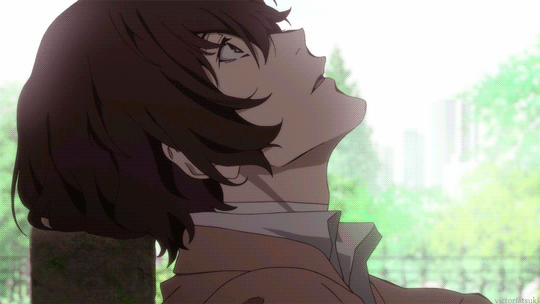
4. I’ll Listen When Nobody Else Will
Everybody knows how Dazai is often brushed off when talking about dying. People have brought up that the agency just has faith in his resilience, but that doesn’t meant that they aren’t acting without care towards Dazai. Atsushi does this too - in the very first episode, Dazai’s attempt at suicide is just taken with him being exasperated at his antics before pushing him down. But here’s the thing - it’s generally agreed upon that Atsushi is the one who is sent out to find Dazai. Atsushi is the one who knows where to find him. Arguably, Atsushi is the one that will listen to Dazai. He’s becoming the one who can not only pick apart Dazai’s mannerisms and slightest tells - he isn’t proficient, but he’s working on it - but he’s the one that treats them with care.
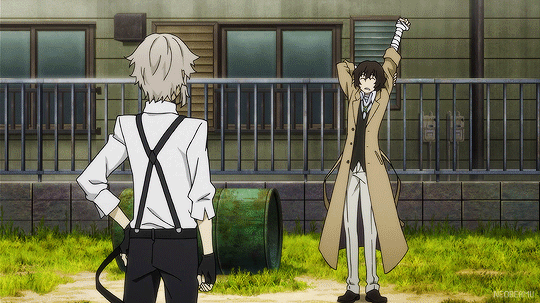
I’ve spent a lot of time noting similarities between the understanding Atsushi has of Dazai to the understanding Dazai’s truest friend had to him. Here’s one thing that separates Oda from Atsushi, and for me, it’s one of the major reasons why I personally ship one more than the other: Odasaku didn’t push Dazai the way Atsushi does. Both Oda and Atsushi have a way of laying out a field for Dazai to talk and bounce his thoughts off of, no matter how cryptically they come out. But Atsushi asks questions, he prods at the darkest corners of Dazai and he allows Dazai to question himself so he can continue to grow. Where Oda gave Dazai a place to feel comfortable in where he was, Atsushi gives Dazai a space to feel comfortable as he grows, which is what he needs in order to continue being a good man.
And please note, this isn’t me saying dazatsu or Atsushi is better than odazai or Odasaku. What I mean to say is this is where the difference lies, and Atsushi gives Dazai what he needs now - something he might not have needed without Odasaku’s urging to leave.
5. Guiding Light
When two characters are each other’s north star, where is there not romance? Dazai is very much Atsushi’s main source of guidance, a side effect of being his mentor for sure - but it’s more than just asking questions. Their relationship runs deep into Atsushi’s train of thought, to the point where Atsushi hallucinates Dazai’s presence when he feels uncertain. Any time Atsushi needs guidance or reassurance, he looks to Dazai.


This is more shipper goggle-y, but I like to believe Atsushi does the same for Dazai. I’ve said over and over again that above all else, Atsushi is Dazai’s proof that he is being good. I also like to think that Atsushi, in a way, is a ray of light for Dazai to follow. He’s selfless (although for some reasons that deserve to be readjusted), he’s kind, and he loves life - all life. He’s a sunbeam in action that provides a perfect example for what Dazai could be and is trying to be - and if this light is happy with keeping Dazai close, maybe there’s hope for him after all.
6. What Makes Life Worth Living
Atsushi and Dazai are opposites in once major aspect: Atsushi has a sort of reverence for life, whereas Dazai craves to escape it. These are two major points of their characters - but here’s the kicker. Dazai wants to get close to human emotion. He wants to understand what makes life worth living. Atsushi is quite possibly the strongest candidate to show him what he can do and how loving life can help. I’m not saying that Atsushi is Dazais’ fix-it-all elixir, but he has a good chance to gently prod at Dazai and get him thinking.
Atsushi can show Dazai what makes life worth living. And that’s something that I think would do Dazai a world of good.
7. Can I Change for the Better?
ATSUSHI! INSISTS! DAZAI! IS! GOOD! I will not ever diminish this point because it is so important! Dazai seems to have it in his head that his blood is mafia black, that he can play the charade of a good man but will never be more than an actor playing a part. Atsushi, though - Atsushi is constantly telling him that he is good. Atsushi, who probably couldn’t keep up a lie for that long because the poor boy has zero tact. Dazai even asks Atsushi frequently if he’s a good person, and Atsushi always says yes. Atsushi gives Dazai what he needs to hear.
Atsushi, however, has his own issues. He has his own trauma to tackle, and his own bad habits to reform to become a better person. Atsushi isn't’ a bad person, but he also isn’t the best version of himself. Dazai can help him become that. Dazai can give him the guidance he needs, as he did with sorting through his grief surrounding the headmaster. Dazai can help Atsushi start the battle against his past, and he has been there with him every step of the way, whether in body or spirit. They help each other be better.
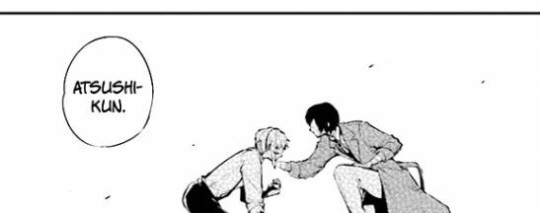
8. I Trust You With What I Love Most
I’ve said this before and I’ll say it again - the toast they added to the end of season 3 is one of the most tender moments Dazai has ever had with anybody. One thing Dazai never does is let people in on his past - not past the necessary details, anyway, and especially not the intimate moments he holds in his heart. But sharing that toast with Atsushi - inviting him in to the toast he shared with Oda and Ango, “To the stray dogs,” - it’s one of his most vulnerable times on screen. I don’t care what you say. Dazai deliberately letting Atsushi in, giving him this tiny piece of his past he’s had tucked away in a safe place - that was him offering up a piece of his heart. I’m soft just thinking about it again.

Other than that, Dazai has an enormous faith in Atsushi. He’s built entire plans trusting that Atsushi will do his job perfectly the way it needs to be done. Hell, towards the end of the Guild arc, it was his faith in Atsushi to bring the doll down to him that convinced Twain they were beat. Not to mention, Dazai has trusted Atsushi enough to form a new partnership without him in order to protect the city - and if that’s not one of the most blatant displays of trust and faith you’ve seen, I don’t know what is.

9. There’s a Softness Within Me I Didn’t Know I Had
Another thing that’s good for Dazai - Atsushi is comfortable. Dazai can let his guard down, just a tiny bit, around Atsushi, There was the graveyard scene in Dead Apple, or the toast scene at the end of season 3 - those are moments where Atsushi has given himself a moment to relax and show Atsushi how proud he is. This kind of emotion, this vulnerability that says ‘I’ve been hoping you’d pull through and look at how amazing you’ve become’ - there’s a softness that holds that Dazai doesn’t hold for anybody else. It’s a gentleness or pride, of trust, of somebody becoming more than you could ever imagine and coming back to you, even thanking you - it’s a sensation nobody else has given Dazai, because nobody else has been a protege as trustworthy and gentle as Atsushi.

(and, believe me, there’s a hundred other examples of the softness in the anime, manga, official art, and so much more. here’s a thread that you can still add to if you want)
Atsushi is also soft with Dazai. He wants to make him proud, sure, but there isn’t any fear once their job is done. Atsushi doesn’t have to fear horrible repercussions if he makes one misstep - Dazai allows him to learn, to grow, and to feel however he seems fit (or, it’s a skill he’s improving at as the series goes on.)
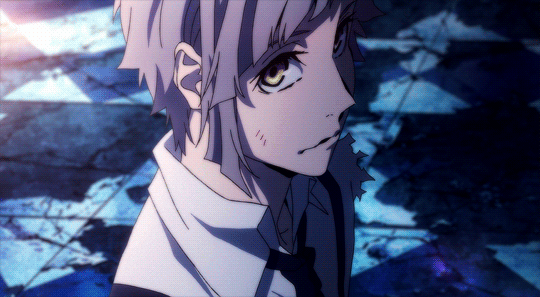
They give each other a safety to feel vulnerable. They are comfortable to each other. And, of course, they have a special softness for the other that they do not hold for anybody else.
10. My Mistakes are the Cracks You Have a Knack for Fixing
Again, Atsushi is always there to reassure Dazai that he can be a good man. One part of this is that he insist that Dazai’s past doesn’t have to affect his future. He’s one of the only people who tells Dazai that he doesn’t hold him accountable for what he’s done before - he’s Dazai-san now, and that’s what matters to Atsushi. Atsushi gives Dazai the most space to fix these mistakes, to move past them, and to learn from them, not holding them against him at all.
In the same way Atsushi is Dazai’s proof that he’s being a good man, he is also Dazai’s proof that he can fix the mistakes he made. (Of course, I’m not excusing the way he strings anybody along - but the first step to fixing a mistake is admitting you have made one and working on yourself, and that’s what Atsushi allows him to do.)
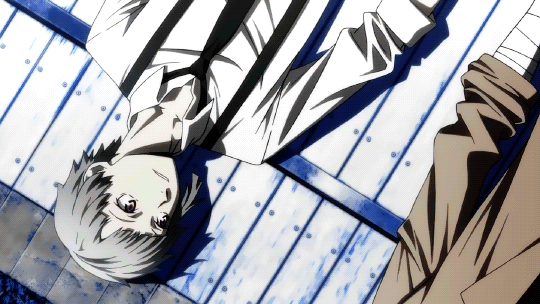
In conclusion, I think Dazatsu is so soft and amazing because it’s about the healing and acceptance. BSD is all about gray morality, and dazatsu is a soft ship that can take each other’s bad and accept them. It’s not only about seeing the darkest side of somebody - it’s about accepting those flaws but also giving them space to grow. They grow and they learn and they heal together. They ensure that the other never has to go through a drastic change alone. In a way, they can be home for the other, a refuge from the shitty cards life has dealt them and a steady lifeline to reach for a better tomorrow. That’s why I love dazatsu - because I can’t see another situation with nearly as much love and trust as they have. They are tender, they can be vulnerable, and they can heal.
Like the beautiful sunset hours the met in, they celebrated in, they console each other in, they allow the other to turn the page on their past and start anew, with a clean canvas for a dazzling display that they can make together.
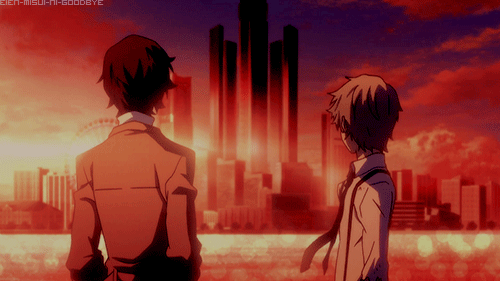
#dazatsu#dazushi#dazai x atsushi#bungou stray dogs#bungo stray dogs#bsd#dazai osamu#osamu dazai#dazai#atsushi#atsushi nakajima#nakajima atsushi#bsd meta#bsd dazai#bsd atsushi#attempted meta#meta#orig#long post#spoilers#manga spoilers#bsd manga spoilers
776 notes
·
View notes
Text
Studio Ghibli; and the aesthetic of comfort and the mundane.
When it comes to animation movies, Studio Ghibli movies are still some of the long standing staples of the genre, and for a good reason. A lot has been said about these films, their thematics, their characters, their stories and the studio that made them, as well as one of their elusive and yet most well known creators : Hayao Miyazaki. I will try to focus on the ways Studio Ghibli views comfort as well the coziness in these little slower moments that fill the universe of Ghibli films. These movies are generally universally loved by the public, despite the fact that they are aimed toward a younger audience. These movies are definitely created with the goal of showing it to a public of children and families, and yet they still are very complex and layered pieces of art and animation that all audiences can appreciate. These movies also do not look down on their audiences, they do not shy away from touching upon more difficult themes such as war, loss, and fear, in a manner that’s adequate for the public it is targeting. With this article, I want to write an extension on the article I have already written on the subject of slowness in cinema and that has been asked by one of my subscribers on patreon. If you haven’t read that article yet, you can read it HERE on my blog.
The films that have been created by Studio Ghibli, are, and with reason, a cornerstone of the animated movie industry. Despite the fact that these movies are definitely intended and made for a younger audience, I think we can all agree that these particular movies can be appreciated by everyone, at any age, and that anyone can find meaning and solace within these movies. Studio Ghibli movies are truly an excellent example of filmmaking that manages to capture a slower pace in media, slowing down the action to just offer a moment to breathe. Between all of the grand adventures and events that are happening in those movies, there are always moments of slowness to be found. Of calm. Of quietness. The characters of the Ghibli universe are permitted to simply exist sometimes.
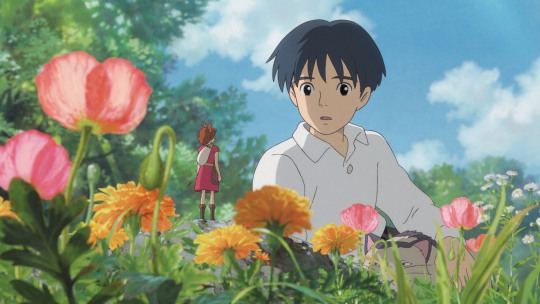
The concept of slowing down in media is one that I deeply appreciate for the way it brings depth and serenity in stories. This is a very personal point of view of course, I find the modern pace of capitalist life deeply alienating at times, and sometimes I think we just need a moment to slow down and enjoy simply being. Doing nothing is a very anti-capitalist thing, in my opinion, and I greatly appreciate seeing this concept in books and movies. While being productive is always a nice feeling, and god knows I always enjoy being busy and having things to do, it is always in these moments where I feel submerged by everything I have to do that I yearn for some peace and quiet. While it is not always possible to have this, it is always possible for me to simply … start a movie, and try to escape a bit the weight of the world.
I personally think having these moments to be able to just breathe and be truly enriches a movie. Those moments of simple mundanity and ordinariness ground the story in reality even when the story is about a wizard living in a moving castle. Studio Ghibli movies are the epitome of films that can focus on fantasy and the imaginary and telling incredibly original stories, while also including this measure of the mundane, the routine and the ordinary in between the louder and more action-packed parts of the film. This way of constructing these films, makes it so that the universe feels more lived-in, real and comforting, the characters feel more grounded and rooted in reality.
Studio Ghibli: a brief history
Even though Hayao Miyazaki started working as an animator in the 1960s, working in TOEI animation and learning the tricks of the trade, it is only later in 1985 that he established Studio Ghibli as we now know it, with the partnership of Isao Takahata and Toshio Suzuki. It is with that previous working experience that he got to truly construct an identity as the type of animator he wanted to become, and the type of movies he wanted to produce. Before Ghibli, Miyazaki got involved with different animation projects such as Heidi (1974) , and Anne of Green Gables (1979) and a project that would never see the day : Pippi Longstocking. This project is quite interesting in how it simply … never got made, its a bit like a lost part of history, a what-if. Despite the fact that Hayao Miyazaki had drawn a lot of concept arts as well as storyboards for this project, they never got the green light from the swedish author Astrid Lindgren.
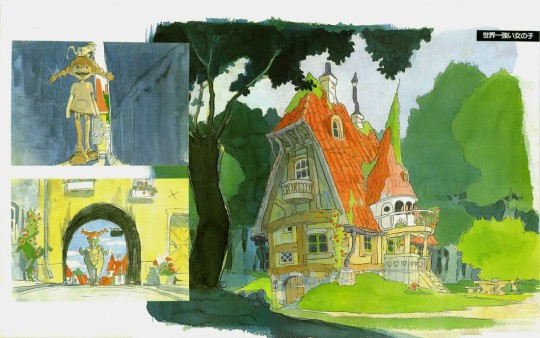
Nonetheless, it is obvious how all of these projects forecast how Miyazaki and his business partner Isao Takahata will more often than not try to center young girls as the main protagonists of their movies. A trend that will continue on for the most of their careers to this day. They will continue to focus on young girls and women as the main characters of the stories they are telling in such a complex and intricate way, all of their female characters are different from each other, with their own complicated inner lives, dreams and goals. It seems like such a basic requirement to request from our media, and yet even now, it is still not something that… will be guaranteed in the stories we consume. It is not to say that ghibli’s portrayals of women is perfect, but I do appreciate their very complex heroines and their adventures.
I will not try to pretend that I can totally understand the type of person that Miyazaki is, he’s a complicated figure at the helm of Studio Ghibli, the man behind the curtain. He is definitely a hardworking and self-critical person, but also deeply critical of others as well, wanting to set up very high standards of work that can be extremely difficult to achieve in a very high pressure environment. Thus is the complex personality of Miyazaki. I do not want to pretend he is a perfect man, and I do think some of his choices are things i don't quite agree with. There are some very valid and legitimate criticisms to be made about him, some by the closest people he works with as well as his own sons, especially Goro Miyazaki, who say that his father was always very distant, working long hours even by the era’s standards, and whose heart was obviously more into his work than his home life. Hayao Miyazaki valued work and putting in the time and effort into his art and job, pushing for very unhealthy job practices and work culture.
He is far from perfect, and seek perfection in his work, both from himself and the people he works with. There’s a lot to be said on that aspect, and yet I still very much think that he is that he is still a very fascinating person to reckon with, someone who brought very important and beautiful stories and revolutionized the world of animation in a really significant way. The universes he created are some I keep coming back to times and times again. I also highly recommend the documentary A Kingdom of Dreams and Madness (2013) if you have not seen it, as to have a glimpse of the way this animation studio functions on a daily basis. I find it always so very inspiring personally, each time I watch this documentary, I feel hugely motivated to create and to make something, no matter how small. Sometimes, it is simple about the sheer act of creating something, of spending some time away on the roof, looking at the skies while a cat is sleeping next to you.
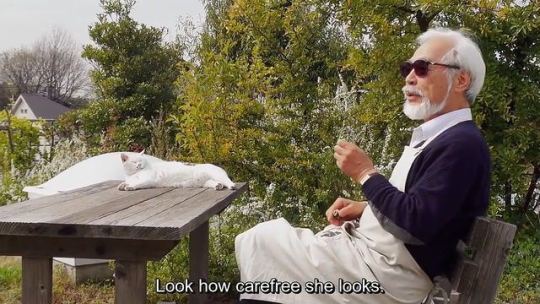
His involvement with the Union during his early animator years left him with a leftist tendency that will continue on during his career and seep through the themes of his movies.From the very firmly anti-war stances to the pro-environmentalist and anti-capitalist and anti-consumerist themes, Ghibli movies are a proof that you can tackle these subject matters in a very conscientious way even in children’s media. It can be seen in the movie Grave of the Fireflies (1988), a heart-wrenching movie about two children trying to survive the last months of World War II. Even though Isao Takahata, who directed this movie, says the movie was not made out to be an anti-war movie, this stance is still very much woven in the very fabric of the movie, from its beginning to its ending.
This specific theme is very important here in terms of the experience of the mundane and the ordinary in Ghibli movies. Even within the most devastating of events, smaller moments of slowness can be found, and appreciated. Quiet moments of peace that feel even more poignant in the midst of struggle. Despite everything, I think we have all come to the conclusion that even when world-shattering events are happening, life truly must go on. And it does find a way to go on, and it feels mind-boggling that we all have to do our groceries, cook dinner, wash our laundry while terrible events keep happening, and yet, these mundane moments still occur. It is still possible to find a moment of respite and peace in the midst of uncertain times and terrible events.
But also, as Marco says it in Porco Rosso, « I’d much rather be a pig than a fascist » and I think this really does say it all.
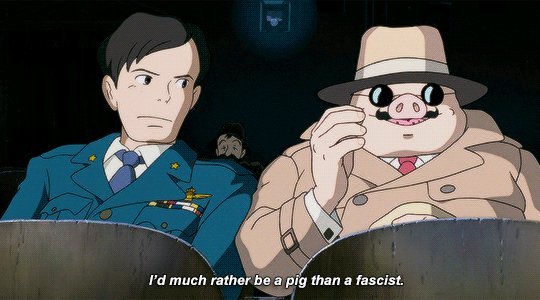
The aesthetic of comfort
Despite being usually an animated movie set in a very obviously fantastical universe, Studio Ghibli movies tend to be very realistic in the way they portray the characters, their complexity, and also what are the real underlying conflicts. For example, in Kiki’s Delivery Service (1989) «The primary conflict isn’t about magic—it’s internal and invisible and wholly human: Kiki’s brief period of lost motivation and artist’s block. She gets it back when she wants to help Tombo, whom she loves. Simple as that. She doesn’t have to wage an epic battle to prove her worth» The stakes might seem lower in this movie compared to other stories, very mundane and ordinary, there is no war, there is no significant conflict, but I think this is what makes it so special in the end.
One of the particularities of Ghibli movies is how they deal with the notion of childhood, a notion that few animation movies have approached with such delicateness and seriousness. One of the things I really appreciate from Ghibli movies is that it does not shy away from treating children as complex beings. It does acknowledge the fact that children are also able of complexities and of understanding more than we think they do, and yet creating media that is easy for them to comprehend and appreciate, which I think is no small feat.
There is definitely also a definite focus on working class characters instead of the more “prestigious” ones in Ghibli movies, there is a desire to center normal people, whatever that means, in their stories. Most of the characters have to work for a living, earn their lives, and the value of hard work is definitely something that is highlighted in the Ghibli universe. In Kiki’s Delivery Service (1989), the baker’s wife tells the young witch that work is work no matter how small and insignificant you might think it is, and all work should be paid, and it is a truth that should be remembered.
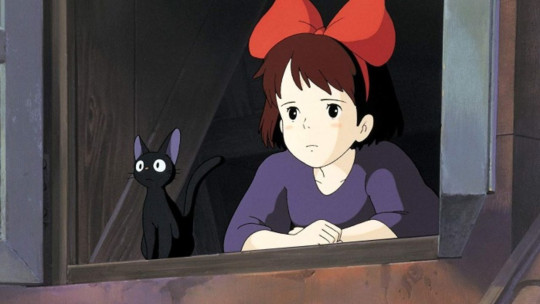
In that movie, here is no world shattering events, no wars or massive destruction, only a young witch trying to make something out of herself, losing her will and creativity and gaining it again. That particular theme is one that resonates a lot with people on a very basic level, especially in this current day and age where so many of us are trying to monetize our creative work. So often, trying to capitalize off a hobby and enduring the bone deep dreary weight of capitalism is what will make artists lose their original inspiration and will to create, when a hobby turns into labor, and this is, at its core, the journey that Kiki went through.
As Robert Ebert told Miyazaki, during an interview with him « I told Miyazaki I love the "gratuitous motion" in his films; instead of every movement being dictated by the story, sometimes people will just sit for a moment, or they will sigh, or look in a running stream, or do something extra, not to advance the story but only to give the sense of time and place and who they are.»
And he was right, Ghibli movies have these moments where the action is not something that is strictly essential to the plot of the movie, and yet it is essential to the essence of what Ghibli movies do. Miyazaki then explained what this concept for him meant for him :
«"We have a word for that in Japanese," he said. "It's called ma. Emptiness. It's there intentionally."»
Those slow moments between the actions are thus very deliberate, they mean to slow down the story and to slow down the pace. Unlike the generally accepted school of thought in modern Hollywood cinema, where every single scene and dialogue needs to move the story forward, Miyazaki lets his story and movies breathe and exist. This way of building a story does give it an added sense of calm and soothingness, but also it gives it a sense of realism. Instead of following a strict narrative outline, this fluidity makes the story feel more real and relatable.
These quiet moments and details that might seem innocuous and useless at first glance, and maybe look like they would slow and hinder the pace of the movie in itself, are ultimately what gives it this feeling of genuineness, of sincerity. It lets the characters as well as the plot have the space to breathe, evolve and grow.
« Although these scenes may seem slow or unimportant, they give space to develop the characters and to heighten dreams or feelings the characters are having such as feelings of isolation, wonder, or anxiety. It is in these moments of stillness that the audience can contemplate with the characters and feel what the characters are feeling. These moments remind the audience the importance of stillness in such a fast paced world and highlights the beauty of a slower paced life»
Studio Ghibli movies insert those slo
wer moments in between their more faster paced and action packed scenes, but also in the midst of world-changing events such as wars, as shown in Howl’s Moving Castle (2004). This demonstrates how people still live on during those crises, even with the danger looming over their heads. This kind of media gives me hope that we can live through this, that moments of happiness and peace are still to be found even within the madness of our very fast capitalistic and hyper consumerist life.
From visibly established routines to a focus on the mundane, the daily. the ordinary, Ghibli movies will definitely bring these seemingly unimportant acts and integrate them as essential to the general experience of the movie. You see the characters inhabiting the Ghibli universe working, studying, sleeping, eating, in a way, you see them being alive. In a manner of speaking, of course, these are fictional characters in fictional universes, but it is obvious that the universe and the lives these characters lead extend beyond what we’re seeing on the screen. They have whole lives and experiences that we might not be privy to, as the audience, but it is apparent that these characters are fully formed. They are going on and about with their lives, and it is this emphasis on the ordinary that makes them appear so realistic.
Falling and getting up again. Jumping and stumbling. So often, Ghibli’s characters are not perfectly graceful beacons of dexterity and elegance, quite the opposite even, their demeanor and posture will inform the character and their place in that world, and yet it is not always perfect and flawless. Sometimes, the characters will run and stumble and trip and fall and this mundanity of being.
This representation of the realness of what it is to be a person, that sometimes we trip and stumble, that we fall and get up again and yet, we continue to walk or run. It’s also a way of defining the different characters, of imbuing them with their own personality and mannerisms and be able to distinguish them even with such small details as the way they walk and carry themselves. This is definitely not exclusive to Studio Ghibli, animation as a whole uses movement and mannerisms as an essential tenet of character, but it is still very rare to see this sort of flailing included voluntarily in the films. Since the medium that these movies are created in is two-dimensional animation, it means that every single frame had to be carefully planned and executed, before being drawn and painted frame by frame. These movements could have been easily not included in the final cut of the movie, they could have been considered superfluous to the film, and yet they were. These imperfect moments are what ultimately makes it better.
Ghibli movies do that, not only in terms of physicality and concrete elements, but also when it comes to feelings and emotions. Emotions that we all feel and experience, from the feeling of restlessness to loss and fear, to love and courage. Ghibli movies really do showcase all of these feelings that we all feel, even though in a manner that is easy to understand for all audiences.
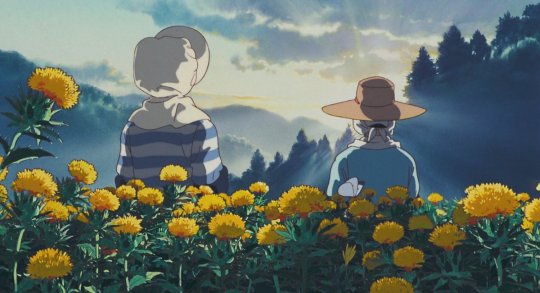
“Only Yesterday does not hit the dramatic highs of Miyazaki’s work, but that’s partly the point. It’s less concerned with presenting a grand thesis about the nature of being human than it is navigating the heartbreaks, triumphs and regrets that make us. But it’s still comforting for a film about the relentless march of time, the title even invoking both the speed with which childhood can pass us by and how close those memories stay with us.
It’s immensely relatable in how it evokes these little tragedies: the feeling of being a fraud; of missing out’ of wondering if you’ve left your childhood self behind; idealism; dreams and all. It asks us not to mourn what might or might not have happened, but to keep those memories close, and use them to move forward. That Only Yesterday makes this feel as wondrous as a castle in the sky or a land of spirits is nothing short of miraculous, and why it ranks among Ghibli’s best.”
The act of eating is one that is heavily emphasized in Ghibli movies, one only needs to read all of the articles dedicated to the mouth-watering food that fills its universe to understand that this simple act, of eating and of preparing food, is one that is very important. Countless of people have made videos on how to recreate some of the most iconic dishes and meals of the Ghibli universe, from Howl’s Moving Castle’s tempting breakfast to Spirited Away’s feasts, both the one that Chihiro’s parents eat at the beginning of the movie and the ones served to the bathhouse’s guests, and the simple snacks that are eaten throughout the movie, from the onigiri Haku gives Chihiro or the food she shares with Lin. Ghibli movies are very well known for how pretty and appealing its food looks, and simply taking the time to showcase the act of preparing and eating food, thus slowing down the pace and creating a break during the plot of the movie. There’s a certain type of media that does put a lot of importance on the act of slowing down, taking the time to cook, such movies such as Little Forest : Summer & Autumn and Little forest : winter and spring, for example. A lot of media that’s just about not doing much and preparing some food, which somehow has a very soothing effect. The act of eating and cooking is part of the greater character narrative and storyline when it comes to Ghibli movies, but also the act of sharing a meal and of eating together.
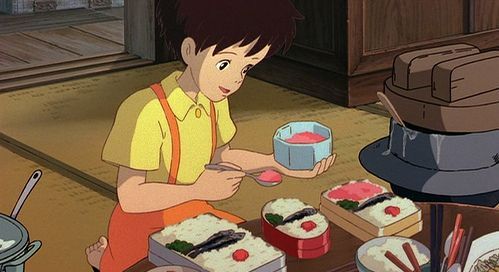
Food, the preparing of food as well as the sharing of a meal, is a love language in itself, in my very humble opinion, taking the time to prepare all of the ingredients and then a dish for someone else or for one self is an act of care. And it is definitely one of the ways it is used in Ghibli movies, from My Neighbor Totoro (1988) in which the eldest daughter is often seen having to prepare lunch and food for her younger sister and her father, since her mother is sick and hospitalized. I will not be talking here about eldest daughter syndrome here, but it is very much a Real Thing™️. It is simply in this representation of the act of cooking, and the care she puts in it, that we can understand not only the love she has for her younger sister and father, but also the very real responsibilities that she has to shoulder as such a young age.
In every single Studio Ghibli movie, this pattern appears, someone will make food, and it will be obvious how much time, effort and love it takes to prepare this dish, or someone will simply take a break from whatever they were doing and take a bite of a small but tasty snack. Somehow, the usage of food in the Ghibli universe is central to the way the characters will experience and move through the world.
It is in these small moments of respite and calm that the characters, and by extension, us, are allowed to breathe. Moments that are quiet, where two people will share a meal and just be. I always terribly appreciate whenever a movie, or any piece of media really, simply takes the time to let the story expand and move at its own pace. Studio Ghibli movies are always ones I love to go back to whenever the world feels overwhelming and slightly unbearable. I hope that we can all have more moments of peace and quiet, that things can slow down enough for us to catch our breath.

BIBLIOGRAPHY:
Hayao Miyazaki interview | Interviews
The Magic and Artistry of Studio Ghibli's Films
The Low-Stakes Pleasure of KIKI’S DELIVERY SERVICE
Wings and Freedom, Spirit and Self: How the Filmography of Hayao Miyazaki Subverts Nation Branding and Soft Power Shadow
Miyazaki’s Magical Food: An Ode to Anime’s Best Cooking Scenes
Food in Spirited Away: Consuming with Intent
Grave of the Fireflies: The haunting relevance of Studio Ghibli's darkest film
NAPIER, Susan. Miyazakiworld : a life in art. Yale University Press, 2018.
76 notes
·
View notes
Text
How Xena: Warrior Princess Allowed Me To Accept Myself
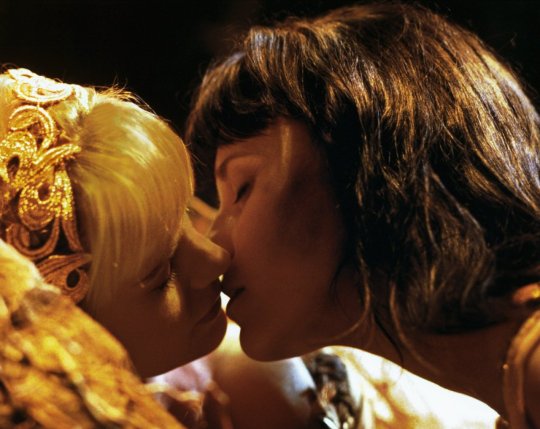
I was living in a city all alone and these two characters showed me that it was ok for two women to love each other.
In order to understand the following story, there’s something you need to know about me. I have always loved fiction. From the age of about 5 to 11, I loved books more than I loved people. I was a shy child who found it easier to emotionally engage with fictional worlds than the real one around me.
See, fictional worlds are created for your brain’s enjoyment. Their rules make sense. Events happen for a reason. The narrator tells you why characters behave the way they do, allowing you to empathize with them on a deep emotional level. Easy to understand, easy to identify with, easy to love.
But real people are complicated. The real world is complicated. And things are seldom laid out nicely in a coherent narrative format for you. Real things are much harder to love.
This emotional disengagement continued from the age of 11 onwards, although it was no longer as pronounced. My habit of retreating into fiction would fade during good times and come back in force during difficult or stressful periods. During the stressful periods of college, the rise of Netflix allowed me to become certifiably obsessed with my favorite TV shows. And naturally, I joined Tumblr in order to more easily fangirl with people who shared my interests.
Only for some peculiar reason that I didn’t care to examine, my interests were slowly gravitating towards girl-girl couples. Soon I was shipping, reblogging, and reading fanfiction almost exclusively about female couples. But I, who had always considered myself straight despite lacking interest in the boys around me, didn’t think this meant that I was gay. I probably just found female couples more emotionally satisfying. I was friends with mostly women, I was a woman myself, so it was natural that I just understood them better. Yeah, that was probably it.
Fast-forward to nine months ago. I was living in Boston and incredibly depressed about it. My job and my boss were making my life miserable and I had very few people to socialize with. I was making the rough transition from the constant socialization of college to the isolating pressure of a city where I had few connections. My days and nights were some of the loneliest I had ever experienced. I looked for something, anything, to lift the heart-crushing emotional silence.
My solution was the same one I always chose when I was dissatisfied with the real world; obsession with a new TV show. And thanks to my femslash-focused tumblr community, I knew just what my next feel-good show was going to be.
My tumblr friends had told me this: Xena: Warrior Princess is an action-fantasy show that enjoys a cult status, much like Buffy: The Vampire Slayer (which I watched and loved). The two shows were made in the same mid-to-late 90's era, with similar bad special effects and endearing campiness. But XWP is much… MUCH… more gay.
That was about all I knew about the show going in. And amazingly, that was all I needed to know to be excited about watching it. You’d think that fact would have told me something about myself, but no. The mental walls of denial were years in the building and needed more force than that to be shattered.
For anyone unfamiliar with the show’s premise, Xena: Warrior Princess is about the title character and her quest for redemption. You see, Xena did some bad things in her previous life on another show (Hercules: The Legendary Journeys). In her storied career as a warlord, she committed such petty crimes as genocide, the slaughter of innocents, that kind of thing. But now she has seen the light and wants to atone for her crimes. Except she can never undo the terrible things she did. All Xena can do now is help people on a day-to-day basis and hope that it’s enough for someone to show her mercy.
Which is already fantastic from a character standpoint. But there is a secret mirror to Xena’s journey that is not reflected in the show’s title, and that is Gabrielle and her character arc.
Oh! Gabrielle! When I met her in the very first episode, I loved her straightaway. She is a feisty, naive, talkative small-town girl who accompanies Xena on all her adventures. Her character quickly assumes paramount importance in the narrative. Gabrielle is Xena’s only friend. She comes to know her better than anyone else and love her for who she is, all the while believing Xena can reach redemption. Yet Gabrielle is not just a support system for Xena; she goes on her own heroic journey. The two character arcs intertwine and co-develop in a way I have never seen in any show before or since.
As each episode rolled by and their relationship grew in complexity, I found myself more and more engrossed. And I came to realize: this was something I wanted. The day I accepted my own desire was the day I accepted myself. What could be more strangling than denying the existence of your own feelings? Yet I had been doing this to myself for years — cutting off the possibility of being attracted to other women — without even realizing.
Before beginning the show, I thought the fandom had read in between the lines to construct a romantic relationship between the two characters, the same way as femslash shippers do in all other TV shows. Except not this time. This one is mind-blowingly different.
Not only does the narrative place utmost importance on the relationship between Xena and Gabrielle, but the actresses bring such multi-dimensional love to their parts. When I saw Lucy Lawless (Xena) and Renee O’Connor (Gabrielle) interact, I could so easily believe that these two women loved each other beyond friendship. Xena and Gabrielle display every kind of love you can think of. They protect and sacrifice for each other. They tease and flirt. They cuddle and console. They have inside jokes with each other. They dance sexily. They play pranks and drive each other crazy. They sweetly kiss. They come back from the dead together. They bathe together. They raise each other’s children. They meet in alternate timelines and fall in love all over again.
I could have left my mental walls of denial in place. I could have said to myself “oh yes, I want this. But with a guy.” But no. Lawless and O’Connor’s incredibly attractive faces and bodies broke down the door of my mental closet. Precisely because they were fictional, I felt safe to admit my attraction to them. One of the key mental blocks I had always had towards accepting any attraction towards other women was the thought that I was being creepy. That since they could not possibly feel the same way about me, it was wrong to feel the way I did. But in my mind, that barrier didn’t exist with fictional characters. They couldn’t feel anything for me. Therefore, it was fine to feel whatever I want about them.
The walls cracked. The water came rushing in. Oh my god. I am attracted to other women. Like, every day of my life. Those flickers in my stomach when I talk to an attractive female coworker suddenly make a whole lot of sense now. I now saw my historical awkwardness when talking to beautiful girls, which I always dismissed as “me being weird”, for what it was. All those short-term girl crushes on older girls throughout high school. How was I so sure they were platonic? That heart-aching infatuation I had with my best friend that lasted for years? Yeah, add that to the ‘definitely gay’ list.
Since then I’ve realized that my feelings are valid regardless of what others feel for me. Just because feelings are unrequited doesn’t mean they aren’t real. That’s what Xena and Gabrielle taught me. Their fictional example was the final blow to my rapidly-crumbling resistance to the idea of homosexuality.
In our culture today, so many forms of media reinforce heteronormativity. How many commercials have you seen that assume attraction between a man and a woman? How many billboards tell women that they need to look sexy for the men in their lives? How many times has a movie ended with the guy getting the girl? It’s the combined action of a thousand small rocks shifting to make a cultural avalanche. You can’t move against it. All you can do is stand still and try to maintain your footing against the current, to maintain your identity in the face of a world where you and people like you are often swept away by the mainstream.
Xena: Warrior Princess is one of those rare stories that dares to go against the grain. It celebrates a romantic relationship between two women as the most natural thing in the world. And in doing so, it provides a mirror for me and people like me to recognize themselves in. There we are. Look at us fly.
This story isn’t over yet. I still have a lot of work to do to accept myself, but thanks to Xena and Gabrielle I’ve taken one huge step towards living the open life I want to live. I moved on from that horrible job and lonely city, but in the end I’m grateful. Grateful that circumstances pushed me to the depths of loneliness necessary to bring down the prison I had built in my own mind.
- How Xena: Warrior Princess Allowed Me To Accept Myself by Lyra Hall
#if this doesn't convince you to watch the show i don't know what will#i love this article so much!#xena#xwp#xena warrior princess#xena x gabrielle#gabrielle#gabrielle x xena#xena/gabrielle#renee o'connor#lucy lawless#tv show#lgbtqia#lgbt#article#quote#passage#xena & gabrielle#gabrielle/xena#xena: warrior princess#subtext#lesbian#bisexual#lesbian subtext#queer subtext#analysis#review#discussion#xena and gabrielle#gabrielle and xena
75 notes
·
View notes
Text
Captain Bucheon 01
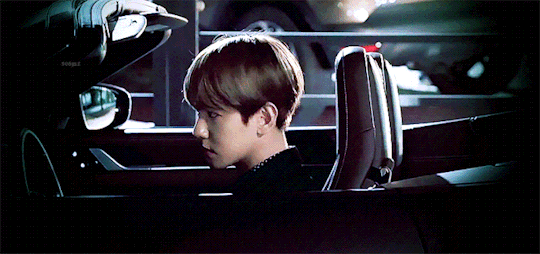
(gif is not mine)
Pairing: Baekhyun x reader (Lee Nari)
Genre: policeman AU; enemies to lovers AU
Warnings: langauge
A/N: First chapter! Yay! Super excited! Also, the feedback I got for the prologue - THANK YOU SO MUCH. Im super excited and happy and grateful. Hope you will enjoy this one! ^^
story masterlist masterlist
: prologue
>>>First<<<
Loud screeching was what woke you up. Thundering of footsteps down the corridor made you groan and turn in bed because for god's sake, it was Saturday morning and they just had to be loud at 10am!
Your roommate, lying in the bed just four feet next to yours, stirred awake too, though considering her eyes were fully open, she must have been up for a while now. “I’m glad it’s them waking you up and not me.”
You sighed and managed to smile but you were tired. Life in dormitories sucked, but yours even more so since you were assigned probably the worst dorms in the campus. Having to share bathroom and shower rooms made you leave your comfort zone. But finding toilets in the terrible state you did just purely horrified you. Why weren’t some girls flushing the toilets?!
“You know very well I won’t kill you if you wake me up, Yuyeon-ah,” you mumbled, your voice hoarse. Having Yuyeon as your roommate was the only positive aspect of the dorm life. Some would argue it’s the most important one but you were selfish and you wished you had a private bathroom like the other, more advanced, dorms had. There wasn’t even a kitchen where you could cook your ramyeon deliciously!
“Doubtful,” muttered Yuyeon, amused, and she moved to sit up and start her morning routine while you decided to lie around for just a little bit longer.
Working tirelessly many evenings made you tired and the exhaustion always caught up with you during weekends, where, frankly, you didn't have work. Also, it being the beginning of your second semester, the tension and stress were on but you decided you wouldn't let it affect you too much. You have had enough stress in your entire life and you swore you would become your usual cheerful self.
And you had been, indeed, working on it. But that meant getting over, and hopefully, forgetting everything that happened almost one year ago. Your brother was still in prison and your family, terribly disappointed and in pure shock at what had become of your brother (plus your underage drinking fiasco), you all decided it would be better for you to move to the dorms for the time being. Another story was forgetting about the person who was behind the entire turn-over of your life.
Byun Baekhyun.
You never saw him after that one time he came to your high school. In that moment, you were numb, paralyzed and it hurt to see him. He dared to act like he cared. But over the time, you grew hate towards him. A hate that was weirdly combined with some emotions you really didn't want to pay too much attention to, because they were all based on a fake relationship. A relationship, that was something so beautiful, just for it to end up becoming a complete nightmare. A trauma. A terrible trust issue that you might never be able to get rid of.
It was safe to say that you, Lee Nari, would rather spit at Byun Baekhyun than ever start a conversation with him let alone acknowledge his presence were you to meet him. Not that you were expecting to meet him. After all, you had been incredibly careful - especially around Oh Sehun - in avoiding him by never-ever-ever-ever even coming as much as close to the street where the main Bucheon Police Station was located (but too bad for you; it was literally in downtown Bucheon) and even if you had to cross it, you whined and had to be dragged by your wrist (by Yuyeon). On the good side, there was never a chance for you to cross his apartment building as he lived in a different neighborhood. So that was, thankfully, out of the possible trouble inducing locations’s list.
But still, you couldn't help feeling anxious about spotting him somewhere. The first few months, you might have been looking around with too much hope, wanting to see his real self instead of the ogling at the few photos you had together stored in your phone. Just one glance of his eyes, nose, lips was what you wanted; it was maddening.
Then the flashes of that day came back, ruining every sweet memory, every sweet touch of his engraved into your skin, every stroke of his lips - it all vanished, instead morphing into his stern, burning gaze of which you were on the receiving side. The way he blamed you, the way he wanted to arrest you, and then the way he wouldn't let even your own mother hit you yet he gave you the harshest of punches… The moment of you overhearing his conversation with his tall colleague (you already forgot his name) until your entire world crashed on you. He lied. He never liked you. He never wanted a real relationship with you. He used you to get to you. Byun Baekhyun wanted to arrest you and then he arrested your brother and smashed your heart into tiny pieces. How could you ever recover?
“What, you're not getting up?” shrieked Yuyeon when she came back from the bathrooms, towel hanging around her neck. “The results of the votes are today so you better get up and prepare. You're the school's star, missy,” she grumbled and went over to her table, continuing her complex skin-care routine.
Right.
The way to get over Byun Baekhyun was to live and you could do that thanks to your friends.
Pfft, you had places to be. Forget about Byun Baekhyun.
><
Because of your communications major, you somehow ended up in the university’s student council. You were representing your school year but it was still unclear how the hell you managed to win over more than half of your classmates when all you ever did was hide or be with Yuyeon.
You entered Bucheon University with pretty damaged self-esteem, your cheerful self still recovering from the scandal. However, despite always doing something mischievous with Yuyeon neither of you had a huge circle of friends. It was only natural that the two of you did everything together. Even now, it was mostly you and her, plus Sehun and some other friends. Unfortunately to you, many males voted because of the nature of your chest. The quiet girl with huuuge boobs, they were saying with hushed voices.
“Don’t pay attention to them, it’s you winning at the end of the day,” advised Yuyeon at the time.
So when the both of you waltzed into the seminar room with a round table in the middle and took seats (Yuyeon was there for your moral support), you could only glare at one senior who was sitting opposite you, his eyebrows wiggling as he shamelessly drunk in your chest which was, as per usual, hidden under an L-sized hoodie. It seemed you could never escape.
When the president of the student council, Chul, appeared you all stood up and bowed to him respectfully even though he was a student just like you. He was the oldest though.
To your surprise, he walked straight over to your chair, throwing a charming smile at Yuyeon, who let out a quiet scoff in return, before leaning down to whisper in your ear, not forgetting to touch your shoulder gently: “May I have a chat with you? It’s rather private.”
When he leaned away, you blinked twice but nodded and followed him outside for a moment. You could hear whispers erupting after you left though you paid no attention to them.
“What is it, Chul?” you asked, crossing your arms over your chest. Chul was one of the very few who never got distracted by it and you were thankful. He helped you a lot in your first semester, like finding you a job and teaching you how to drive a scooter so that you could easily do the deliveries while introducing you to some other interesting people on the campus.
“So about the spring festival - I have two things,” he started, his gaze set on your eyes, always making sure he reciprocated the eye contact. “First, you are taking part in the relay running for our team with representatives. Second, you have been requested as the MC-“
Before he could finish, you sighed holding out your hand to stop him, feeling the nerves kick in, not even paying attention to the first news. “Those votes aren’t even valid. They are all mocking me, Chul. Besides, I don’t wanna do it.”
Chul let you finish, patiently nodding. “Well, hence me stealing you from the meeting.”
“What do you mean?”
“You’ve been requested,” he repeated, emphasizing the last word, “by our main star.”
“I thought we haven’t heard back from the agencies yet?” you asked. You’d written countless emails to various agencies, asking for special famous idols of theirs. To your utter distaste, it also included Siamsa but you couldn’t tell anyone you knew what an annoying, fake bitch she was.
He shrugged. “Well, we heard back from a couple. Siamsa agreed to be the main star of the festival under one condition,” he murmured, lowering his voice. He pointed his index finger at you. “If you’ll do the MCing for her.”
That left you speechless. That delusional woman wanted what now?! “I don’t want to, Chul,” you shook your head, frowning.
It made you wonder why you were getting nervous in the first place. Was it because of her status and having to stand in front of your entire school or was it because of the connection you both shared and that was Byun Baekhyun? Just the idea of having to face her and having to be reminded that she dated your ex made you weirdly sick in your stomach.
He sighed, scratching his neck. “I’m sorry, Nari, but I’m afraid I’m gonna want you to accept it. She is the hottest idol out there and everyone wants her the most. Imagine the attention our university - and especially us, the school council, could bring in. Don’t let us down,” he added gently, though you could sense authority in his voice. Chul was always fair, you had to admit. He never asked you to do anything that made you uncomfortable, never asked you the reason for your reluctance in the past but now he insisted and it showed in his intense gaze.
“I’ll help you with the preparations,” he added, smiling encouragingly. “You’re much more outspoken and talented than you give yourself credit for, so I’m sure you’ll be a star just like Siamsa.”
Well, he really didn’t have to say that last sentence. If there was someone you wanted to be like, it was your good old self. Of course you had more talent, after all you were the big-mouthed one.
Chul patiently waited, seeing that you were mulling over the options. When you looked up at him, you slowly nodded while hating yourself. “Fine. I’ll do it. But-” you stopped him from smiling widely, “what happened with the original voting? Who won?”
“Obviously, you.”
You shook your head quickly. “But I mean who is the actual winner?”
“Not important,” he muttered, brushing past you. “Let's head back inside. Not everyone has the time to sit around waiting on a Saturday.”
><
Once the meeting was over, you couldn't wait to spill the news to Yuyeon but needed to wait until lunch time, when you would meet Oh Sehun. You had sent him a text earlier asking if he was still grabbing lunch with you and Yuyeon (secretly you were writing these messages for obvious reasons - you couldn't risk he would be with Baekhyun). Since he had agreed, you and Yuyeon were speed-walking to the cafeteria, both of you hungry.
Once sat down and joined by the tall friend, you looked around varily just to make sure he really came alone.
Sehun sighed, tired with your dramatics. “I'm alone, Nari,” he rolled his eyes as he was mixing his tuna bibimbap. “And now spill. The both of you have been acting like rabbits on energy drinks.”
Shooting him a frown, you still rambled away for ten minutes, telling them what had happened. Yuyeon knew about Siamsa and your past experience with her and Sehun also knew the vital triangle connection of Siamsa, Baekhyun and you. He still seemed shocked and even uncomfortable when he heard your entire story.
“What made her request you?” he asked after he swallowed a big chunk of food. “I mean - does she even know your name? Your university?”
“And you literally met her a year ago,” added fervently Yuyeon, deep frown wrinkling her forehead.
Just like your friends, you also had many questions but no answers. Mulling over various possibilities, Sehun finally spoke up: “Should I ask Baek-”
“No.” Your answer was abrupt, but cold, empty and harsh to which Sehun winced the slightest bit. Even hearing his name made your heart race fast and hence the sudden cold behavior. Sehun knew you as a cheerful, kind girl so seeing you being affected by his friend to this extent made him quite perplexed but nothing he wasn’t used to by now. It was his fault; he should have known better than to bring him up.
Yuyeon shot you an unsure look but this time, you ignored it, focusing on shoving around the rice in the steel bowl with the spoon.
“You should have declined,” tried Yuyeon.
“I did decline,” you answered eagerly. “I feel like that bitch might have something up her sleeve. If she does, I should be ready.”
Sehun was flicking his gaze between you and Yuyeon, thinking over your words. Surely, things you didn't know about could hardly hurt you, right?
After lunch, Sehun bid his goodbyes to you.
“Where are you off to?” you pouted, looking up at him with puppy eyes. “It’s Saturday, let’s do something fun!”
“I’m going to the running tracks today with my friend,” answered Sehun and ruffled your hair in amusement to which you pulled back and away from his sneaky hand. “Maybe later, hm? I bet you’re gonna do something with the student council anyway.”
“You and your running, aish!” grumbled Yuyeon. “Go, go, we don’t need you anyway.”
“Don’t get into trouble!” Shouted Sehun as he turned to walk towards the gymnasium and the track field. He waved one more time before he had his broad back on you.
You scoffed and grabbed Yuyeon’s hand, yanking her towards the dorms. “Well, making trouble has been more challenging since we are old enough to do trouble,” you exclaimed, jumping a few times to make Yuyeon walk faster. She whined and tried to pull away but your grip tightened and you snickered. “But that doesn’t mean we still can’t go and have fun tonight!”
><
“Let’s do one more round.”
“Hyung,” groaned Sehun tiredly, feeling the sweat dripping down the sides of his face. “Enough.”
“One more.” Byun Baekhyun shook his head once before he took off for another round. “Losers will keep losing!” he shouted with a cheeky, handsome smile, running backwards for a bit to check on Sehun and when he saw the tall male run after him in challenge, he snickered and turned back, dashing off into a sprint.
It’d been like this for almost a year. Baekhyun was always a gym buddy with Sehun but in the past eleven months, Sehun became a small, indirect punching back. Whether it was because he suddenly became a mutual friend with a certain someone or whether it was a punishment for being there that night with her, he didn’t know. He didn’t want to know.
One thing he surely did know was that running helped him ease his mind and relax, maybe make him feel a little bit more numb like he so wished to be.
Getting rid of any intruding thoughts of Lee Nari was difficult. He felt sorry for her, the victim of his job. Fooling around with a young girl was not his plan but he knew he did it for the better good. He tried to persuade himself that he did it for the better good while pushing back the need to search for her and make sure she was doing alright.
As he was nearing the finish line, Sehun caught up with him and they both jogged towards their bags nearby the tracks to freshen up. Sehun was heaving like a parched horse which made Baekhyun chuckle as he reached for two bottles, throwing one to his friend.
“Cheers,” exhaled Sehun harshly and quickly opened the bottle, gulping down the needed liquid.
Baekhyun hummed in reply and waited for his heartbeat to calm down before he would have a sip. “How’s everything?” he decided to ask. “The new semester just started.”
Sehun swallowed and closed the bottle. “It’s just the first week. You know the drill - introductions and boring stuff.”
“Nothing interesting happened then?” Baekhyun was very subtle in hints. Sehun was, thankfully, quick-witted.
“We will have the university festival in May,” he replied with the slightest of smirks on his face. “Siamsa is confirmed to perform.”
Baekhyun wasn’t looking at Sehun and even the information he just heard wasn’t worthy enough to make him pay attention. “Cool. She is an artist after all.” He noticed some girls approaching the track and he felt a small tinge of dissatisfaction. He really liked when the track was only his.
“One of my friends will be the MC. Actually, guess what! Siamsa made a special request. Funny, right? In what universe does a singer of her caliber ask for a mere first year student?”
Baekhyun snapped his head to Sehun. “Why?”
Sehun shrugged. “We don’t know why she wanted her out of everyone... though-“ Sehun pulled a thinking face. “It might have something to do with you.”
Baekhyun sighed, already feeling tired. “I don’t like that one bit. Siamsa is sneaky.”
Sehun nodded. “She didn’t want to do it but her senior kind of ordered her. So I guess she doesn’t have another choice.”
“What kind of senior is that if he makes her do stuff against her will?” huffed Baekhyun, his hands on his hips. “Isn’t he supposed to be there to support her?”
“Well, yeah. He did a lot for her so she feels like she has to do it.” Sehun decided to not share any more than that despite sensing Baekhyun’s questioning stare. He knew Baekhyun wanted to know what that “a lot” meant.
When Baekhyun knew he wouldn’t be getting more out of Sehun, he sighed and tapped his shoulder. “Thanks for telling me.” He moved to grab his bag from the floor when Sehun stopped him.
“Hyung.”
Baekhyun raised his eyebrows in question, waiting.
Sehun opened his mouth but then ended up closing it. Baekhyun was a tough nut to crack. It was obvious he was always interested in Nari’s well-being but him pretending not to do so was frustrating.
“I think-“ he re-started, remembering Nari’s emotionless face when he mentioned Baekhyun earlier that day. He opened his mouth to talk but Baekhyun was faster:
“I think it is better to leave everything up to her, Sehun. She is a smart young woman. If anyone can do well, it is Lee Nari. After all, she is finally able to do everything she was pretending to be doing.”
Sehun snorted a laugh, mockingly rolling his eyes. “And since when did you become so-ugh, respectful about that? Nari is stubborn and doesn't know anything about life.”
“It is none of my concern, Sehun,” replied quietly Baekhyun, looking somewhere off in the distance. “But I know she is stronger than you give her credit for.”
“She might hate you and she might not be over what happened between you two-”
“I locked up her brother,” gritted Baekhyun, “and before that, I wanted to lock her up. What makes you think there is any way for both of us to function normally even if we do meet?”
Sehun sighed. It was difficult to communicate with the both of them. Yes, they were both hurt but goddamn it. Anyone could know they cared for each other.
Baekhyun sensed Sehun's dilemma and so he stepped to the taller male and gave him a curt smile. “Don't push it, Sehun. She will be fine.”
><
Sweat was gradually collecting around your hairline until it turned into one huge tear drop travelling down the side of your face. The text message was as clear as the night sky.
Unknown number
drop it at the 1047 unit
top floor
“It's impossible,” you muttered, feeling yourself becoming nervous. You were standing in front of 1047 and it was definitely not the top floor. It was the first floor, just like the first number indicated.
Gnawing at your bottom lip, you raked your head about possible connections you could contact when you couldn't deliver the boxes as you were supposed to. There was never a responsible person, only an unknown number sending you messages with the quest and a requirement to always be careful (you supposed the carefulness was concerning the boxes). You would receive a confirmation message when the box was in safe hands. That was it. No unnecessary contracts; just you and the job at hand.
You tried calling Chul, you senior. After all, he was the one who fetched you the job but even he wasn't available at that moment.
When you were just about to lose your mind, your phone rang making you almost drop the box. Thank god for your reflexes. “H-hello? Chul?”
“Hey, what's up?” he chirped.
You told him quickly your problem but you weren't expecting his light voice to become more serious. “You can't find the place? Are you sure you are in the right building- shit, the time is almost up. I'll be there right now:”
Heaving out a breath, you checked your wrist watch. The box was supposed to be delivered within fifteen minutes. How would Chul make it in time for you, you weren't sure but you soon found out when you heard his rushing steps, his phone's screen lit up with the exact information you were provided with.
“Hey,” he breathed, taking in your worried gaze as you gave him an apologetic smile.
“Sorry for the fuss.”
He shook his head once, muttering a single “no need” before he took the box out of your arms and put it down in front of the door. Grabbing your hand he started pulling you downstairs. “We gotta get out of here.”
“Huh?” you looked back at the box helplessly, before you couldn't look anymore, instead watching out for your step on the stairs. “Wait - Chul, I need to fulfill the task.”
He shushed you and before you knew it, you were outside in the chilly air. Dragging you a few more metres, he heard an approaching car's engine and he was fast to push you into a small alley that was barely lit by any street lamps.
“Chul-” you started, frowning. You didn't like him manhandling you like that.
“Do you trust me?” he whispered as he made you press your back against the wall.
“Yeah,” you breathed, eager to hear any information he could provide you with to explain what the hell was going on.
To your utter horror, a police car drove by, but you weren't terrified about why the police car was there. You were terrified about a certain someone sitting in that car and you possibly having to face that certain someone. Just the thought of having to see his shocked or disappointed face yet again made you inwardly whimper.
When the car was far enough, Chul turned to you. “You are doing a great job, you really are. But you mustn't, by any means, get caught by the police while doing deliveries. Got it?”
Feeling your heart thumping loudly from the adrenaline, you nodded. “What about the box then?”
Chul cursed when he looked at his phone. “Three minutes left. Go in and check the box. If it's still there, take it to the top floor as per request. Sometimes they give misleading information to you in case your phone gets stolen. Next time, make sure to double-check all the information they give you, okay?”
You were nodding eagerly and already started walking back to the small apartment building.
“I have to go but write to me if the mission is successful. Now go, quickly,” he said and without waiting, took off into the opposite direction.
Due to the stress, you didn't even stop to think about the weirdness of the situation. Rushing back in, you went to the first floor where you left the box. You were rendered motionless when the box was no longer there.
Someone took it.
Feeling fear creeping into your system, you took out your phone to call Chul just when you received a confirmation message.
Unknown number
the box has been successfully delivered
#exowritersnet#baekhyun#policeman au#baekhyun fanfiction#baekhyun angst#baekhyun fic#baekhyun scenario#kpop au#kpop fanfiction#exo fanfiction#superm fanfiction#CB#mywritings
84 notes
·
View notes
Text
bittersweet netflix shadow and bone finale (s1 e8) rewatch; accoutrement: white wine with ice cubes in it (no YOU'RE a mom drink shh)
my wine's like fruity I love her
light and darkness title card we love to see it
Inej looking at Alina before she goes below deck to hide <3
okay that 'what can you really do on your own' was like not fun that shit hurted
okay but Jesper's 'not enough'? <3
oh no my baby Zoya's first inkling that Darkles does not really care
omg Helnik just appeared and I remembered how much heartbreak I have to face in this episode
gods I love Danielle as Nina so so much
'this can't be it' said she with her pleading smile with downturned eyebrows MA'AM I-
don't break my dumb little heart
I might hate Calahan's little accent but they're making me tear up
oh gods I literally cannot keep a hold on myself when Dani's accent bleeds through with full force, it's like she comes more alive or smth
'I will keep you warm' SIR WHAT-
I am surprised they showed a leaning in for a kiss so soon but I'm not mad about it
her little eyebrow twitch at 'what are waffles'
when that rando said 'i hunt slavers now' a dread settled into me because I knew what was about to go down
Matthias looking somberly at the stuffed wolf's head </3
I am so incredibly entranced by this exchange between Fedyor and Nina and what it represents, it's very interesting that they pushed up their storyline to match with the timeline
damn it's kind of jarring to be back in the Fold
'REMEMBER WHO'S DRIVING'??!!!! *you better stop* meme, *i am, disgusted* meme, *oh wow, oh wow* meme
Mal you fucking idiot you could never take the crows by surprise
the music rising as Kaz starts explaining his thought process, fucking perfection
haha Mal bitchass Inej caught you
'Because if he isn't with Kirigan's crew, he's with ours' WHEN I TELL YOU I SCREAMED
'And why would we destroy the Fold? It's the greatest weapon we've got' valid point at the moment but you know I don't necessarily agree with your methods
the use of the light tunnel in the show instead of Alina just being a super flashlight in the books is quite an interesting addition as well
is this an inappropriate time to point out how pretty Ben Barnes is
okay I kind of love the depiction of the shadow powers okay sue me
'they are traitors who tried to kill you' why are you suddenly making valid points despite having kind of committed low scale genocide
'i never said I was smart' YES MAL BE THE VOICE OF HIMBOS EVERYWHERE
Kaz's face going from 'can you believe this idiot' at Mal to 'fuck me I'm gonna do the same thing aren't I' at Inej
'For who would oppose us now?' *himbo romantic rival appears out of nowhere and shoots at him* god I love this show
him standing calmly in his ridiculous all black attire after nodding at his soldier to stop the himbo in his tracks, i fucking can't
could she summon light without the Darkling making her after he put the collar on her until the uhm moment in the books? idts but in the show she can hmm
'only because I'm not in the game' you tell him Jesper
not me snickering at 'you'll be seen not as a saviour, but as a heretic' LMFAO
'Shame. I'll have to give that speech again now.' THIS SHOW IS A FUCKING COMEDY AND YOU CAN'T PROVE ME WRONG
YES LET'S FUCKING GO SULI SOLIDARITY
Darkles casually whipping the Cut out like a shuriken or a throwing knife at Jesper because he shot at him lmao I can't
INEJ FUCKING GHAFA STABBED ONE THE OLDEST AND MOST POWERFUL PEOPLE IN THAT WORLD AND THAT IS VERY TELLING OF HER POWER
that moment where you actually think that affected him despite having read the books and watched the show
and then he has to go and fucking say 'it will take more than this' and I can't be help but be a little bit impressed at this old fool's resilience
throwback to when he said 'the king is a child' sir you make some valid points sometimes and it does make it difficult to hate you
I would just like to inform everyone that it is currently 6:09 am IST and I am sipping my second mug of wine while watching netflix sab for the second time instead of doing my three papers that are due tomorrow
I'm sorry but Inej jumping to check on Zoya after she gets knocked over by the volcra? first class display of solidarity and sisterhood as well as Inej's inherent kindness
Kaz jumping in front of a FUCKING VOLCRA AND STABBING IT WITH HIS CANE to save Inej, you best believe love is true, kids
god the volcra are so ugly and gross, they did such a good job with them
they kind of remind me of these creatures (I think they might have been called Hollows or smth) from the Miss Peregrine's Home for Peculiar Children movie
STAG VISION TIME
despite my dislike for the callous nature with which the stag plotline was handled, I kind of dig the stag vision scene
'It's just me and you now, Alina. And we're all we need, anyway.' I actually feel bad for this old fool simping for this wonderful gorgeous powerful woman despite lying to her and manipulating her and exploiting her power
okay 'I never needed you' *stabs the bone fragment out of his hand* beautiful power move I fucking love you so so much
alright ben looking like ✨ that✨ not only in physical pain but also emotional pain at what the Darkling clearly considers another betrayal from this girl he wants to give the world and maybe? loves? maybe? or at least has feelings for makes my fucking heart hurt while simultaneously soar at Alina taking back control and reclaiming her power as her own and stepping into her own
'how do you claim such power' okay could have had better dialogue there writers
the fucking score lifting as she says 'you cannot claim what was not given to you' good people my heart is full
one day I'll talk about my defense of the chosen one trope because god damn I kind of love it
hmm I wonder was that brief hesitation that we saw on Alina's face due to her thinking about the 'you chose to betray our people' comment or the 'i was trying to save us' comment because that will define some of her actions in the later seasons (hopefully god if we get some, I honestly don't know what with this stupid brownface debacle)
I'm not saying talking about brownface and pointing out that it is wrong (for further context, I am actually brown) and harmful is stupid btw I'm talking about the incidents involving brownface in question
I don't wanna talk about this anymore but I might feel like I need to and end up posting about it idk
goodness Ivan actually believing in this cause makes me so sad because he too has been victimized by the system that ostracizes Grisha and he has every right to feel the way that he does
Ben actually fighting in that ridiculously heavy cloak and kefta when he's about to turn 40 this year makes me super impressed because I as a 19 year old sometimes wake up with muscle pulls after weeks of inactivity it's weird idk
also I understand that this Mal Darkling fight is completely fanservice and serves nearly no purpose to the plot in general but like I? love it?
'I don't have to kill you Darkling. Your past will do it for me' YES HIMBO GO OFF YOU TELL THAT OLD MAN GODS THAT WAS SEXY AS FUCK
maybe it's because I know Darkles will survive and will come out of it more powerful but I can't get myself to feel bad for him at the moment
Inej and Mal tearing up at Alina's condition made me almost feel something despite it being super obvious she was gonna be fine and save their asses at the last moment
HER POWER
a solitary Kaz in spotted on the western side of the newly expanded fold in his signature all black emo boy look
okay but the crows with zoya and malina is such an adorable team? I literally love them so much?
INEJ'S FUCKING SMILE AT ALINA GIVING HER THE DAGGER AND KAZ LOOKING AT HER AGSGSGSHSJSJSK MY HEART CAN'T TAKE THIS ANYMORE
SHE KNOWS JUST WHAT TO NAME IT WELL GIRLIE I KNOW IT TOO AND MY FUCKING HEART IS LITERALLY GONNA BURST
okay I know they had one interaction but Mal and Jesper would be besties in another universe
Kaz glaring at Jesper when he answers ''course not' to Alina's 'will you still be trying to kidnap me?' tell me one fucking adaptation that got the dynamics between characters this perfectly
okay why do I love that Alina kept the jewellery as maybe a small nod to she has the wits to, um, you know, I don't wanna say steal, but, um, yeah, steal it because she knew she would need money to survive on the run
oh Jessie I love you so much I wish you hadn't said those things on you ig story about the brownface
it's like every single celeb I grow attached to god's like nope that one is going to do or say something problematic (hey btw im not reassigning blame to god for stuff people have done out of their own free will, 'twas a joke)
AAAAAAAH them saying 'the deal is the deal' in the show even though they didn't have to but like they did and I love them for it
Inej literally not being able to not stare at Kaz's face and smile after this <3
'I didn't expect it to burn at all. But it can be destroyed in the end. Just like him' babe you're not wrong but like um just you wait
god Mal being on supportive boyfie mode is well, absolutely adorable, obviously, but I wish we got to see more of him as a person outside of his attachment to Alina
kaz my little demjin I wish you hadn't have had to suffer so much to meet the crows and find your calling
fastforwarding Zoya's arc is also an interesting choice to me
I wish the hug hadn't been done though, it didn't feel earned
maybe Alina awkwardly and half-heartedly (remember, at this point the alliance is fresh and they still don't entirely trust each other) reached for a hug and Zoya avoided her? and then the rest of Zoya's lines followed? that would have made more sense to me at least
I love Sujaya as well, she brought life into Zoya with whatever little screentime and scraps of writing she got
inej asking kaz 'what's your angle?' beep bop bleep morp I sense another incoming embarrassing love confession
'but we do need you' *stares at her face intensely* 'I need you' ah look at the clock, look's like it's time to screech and flap your arms like you're a volcra because you're incapable of containing your emotions
NO YOU CAN'T GO DIRECTLY FROM KANEJ PROGRESS TO HELNIK BREAKUP (TEMPORARY, MIND YOU)
helnik my loves you don't deserve this I'm so sorry for both of you
Matthias fucking smiling ruefully while he says 'this was... just a cruel joke all along' THIS IS NOT FUCKING OKAY
omg hellgate
AAAAAAAAH NINA IS ON THE SAME FRAME AS THE OG CROWS I CAN'T HANDLE THIS
CAMERA PAN FROM KAZ SAYING 'JUST HOW THIS ALL STARTED... WE'RE GONNA NEED A HEARTRENDED' TO NINA OVERHEARING HIM AND LOOKING OVER?????!!!!!! WHO DO YOU THINK YOU ARE DOING THIS TO ME?!
Nina genuinely being curious as to the status of the sun saint because she obviously still cares
Also, 'But she is a Saint' okay Kaz trying to earn brownie points you have succeeded
DID THAT SAILOR JUST SAY 'GOED MORGEN FENTOMEN' TO MALINA BECAUSE I AM NOT OKAY WITH THEM JUST THROWING THAT IN MY FACE ALL OF A SUDDEN
gods I know I'll probably see them again but my heart is full of sorrow as my eyes drink in the sight of my crows for the last time for a while
I know people were annoyed at the meadow flashbacks but guess what? as a darklina, I loved them
'now that the Darkling is dead' could have phrased that a little differently my dudes that line needed to hold more weight
am I glad that they showed Darkles in this state with his nichevo'ya as a tasty little cliffhanger despite not being entirely true to the source material? maybe but only because Ben Barnes saying 'follow' and the nichevo'ya doing exactly so sent a chill down my spine
well, that's it for now, I'll have to move on I guess, get back to my real life which I'm obviously not ready to do
thank you to whoever actually read these things
I probably should have just made reactions or commentary videos instead but I'm lazy
my tumblr will probably go into inactivity once more as I emerge from my stint in the grishaverse
it was quite short (less than 2 months), considering the length of my other obsessions but it was definitely more intense than the other ones
#netflix shadow and bone#shadow and bone#grishaverse#grishaverse spoilers#six of crows#sab#soc#tgt#the grisha trilogy spoilers#netflix shadow and bone spoilers#shadow and bone spoilers#six of crows spoilers#sab spoilers#soc spoilers#tgt spoilers#alina starkov#jessie mei li#ben barnes#aleksander morozova#the darkling#general kirigan#darklina#malyen oretsev#malina#zoya nazyalensky#sujaya dasgupta#fedyor kaminsky#julian kostov#ivan no last name#ivan
22 notes
·
View notes